Timeline
Meet the Press
Former Rep. Patrick J. Kennedy (D-RI) tells Meet the Press that companies profiting from addiction are worsening the nation’s loneliness crisis, and calls for a national “prevention fund” to help repair the damage.
Chicago Cardinal Blase Cupich
Chicago Cardinal Blase Cupich presents His Holy Father, Pope Francis, with Patrick Kennedy’s book, Profiles in Mental Health Courage, during a break at the synod in the Paul VI Audience Hall at the Vatican on October 22, 2024.

What It Takes to Treat Serious Mental Illness
For those in the grips of serious mental illness, recovery can feel like an unscalable mountain. There’s the struggle to deal with the symptoms — trying different therapists and medications — and then there are all the challenges around health insurance, maintaining an income, dealing with family and romantic conflicts. https://whyy.org/episodes/what-it-takes-to-treat-serious-mental-illness/
Eye on America: Providing support and services for mental health struggles
In Illinois, Eye on America looks at a unique program that connects police officers with real-time resources when responding to calls involving a mental health crisis. Then in Massachusetts, we speak with former congressman Patrick J. Kennedy about his new book that shares the untold stories of a diverse group of Americans who’ve struggled with mental health and addiction issues. Watch these stories and more on “Eye on America” with host Michelle Miller.
Advocating for 988 at AFSP’s 15th Annual Advocacy Forum
In the heart of the nation’s capital, Washington, D.C., from Sunday June 9th to Wednesday June 12th, AFSP hosted its 15th Annual Advocacy Forum!… [Monday] afternoon buzzed with breakout sessions focused on Advocacy 101, Media Tools to Impact Capitol Hill, and A Deeper Dive Into 988. The day closed with a keynote presentation and book signing with former congressman and founder of The Kennedy Forum, Patrick J. Kennedy. His remarks inspired advocates, emphasizing how impactful sharing your story can be.
SHRM24 Annual Conference
As part of the Spotlight Stage, Patrick discussed the deeply compelling stories of bravery and resilience of those living with a variety of mental illnesses and addictions; their inspiring “mental health courage”, the risk it takes to tell their stories; and the effects on criminal justice, workplace and education environments.
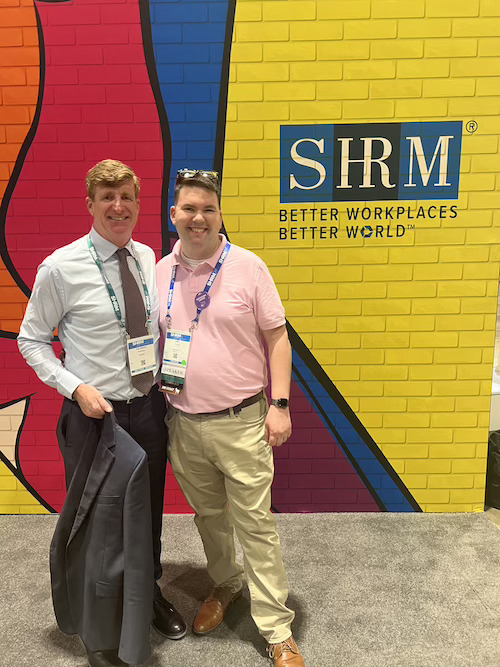
Chicago, Profiles in Mental Health Courage
Patrick J. Kennedy and Philomena Kebec (Chapter 1) discussed Profiles in Mental Health Courage moderated by Dan Gibbons.
2024 Global Loneliness Awareness Summit
Patrick keynoted at the 2024 Global Loneliness Awareness Summit in Washington, DC. For more information on the efforts to end social isolation – https://www.endsocialisolation.org/activation/2024-global-loneliness-awareness-week/.

2024 NASW National Conference, “Social Work: Leading Social Change”
Patrick keynoted at the 2024 NASW National Conference, “Social Work: Leading Social Change”, in Washington, DC, to over 2,000 social workers, like-minded professionals, and thought leaders. By all accounts, Patrick’s talk was amazing, he was regularly interrupted by applause and received a prolonged standing ovation when finished!
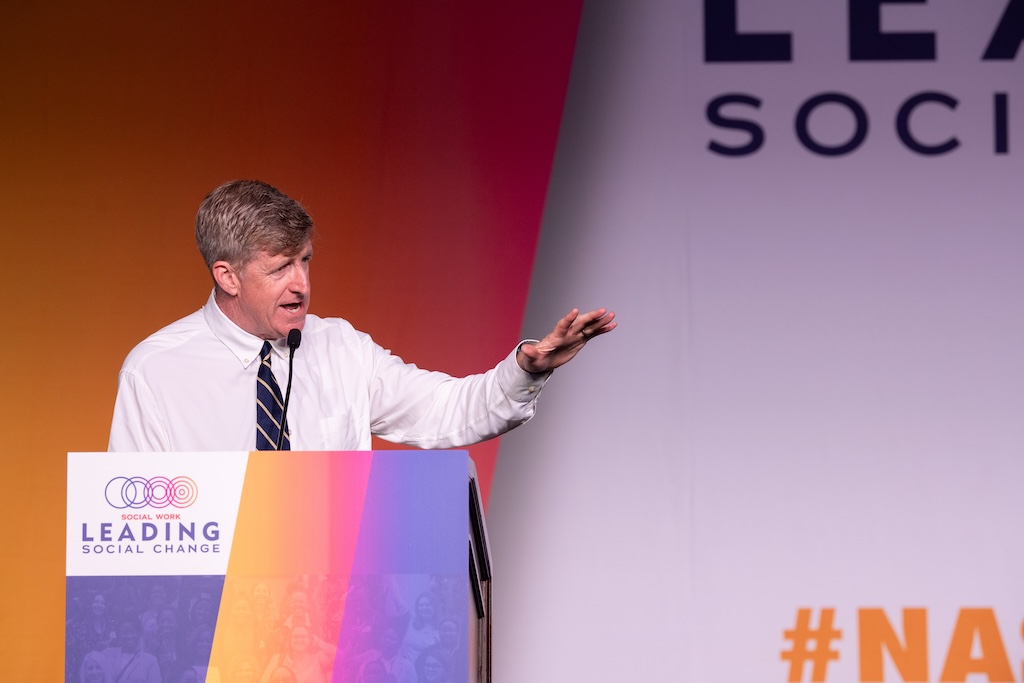
2024 Indiana Mental Health Roundtable Summit
With a focus on the mental health challenges facing young Hoosiers, the 2024 Indiana Mental Health Roundtable Summit, in collaboration with Riley Children’s Health, took place Wednesday, June 12, 2024, at the downtown Hyatt Regency Indianapolis. More than 400 Indiana community leaders, mental health professionals, youth leaders and state officials participated in this year’s Summit. Former U.S. Congressman Patrick J. Kennedy keynoted, and met with Lt. Governor Suzanne Crouch. Also attending were former U.S. Surgeon Generals Dr. Jerome Adams and Dr. Antonia Novello, and former CEO of Eli Lilly, John C. Lechleiter.
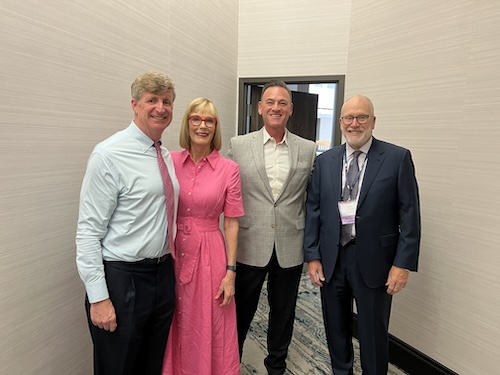
Wellbeing Wednesdays with Chuck Ingoglia, CEO, NatCon
Chuck Ingoglia sits down with Patrick J. Kennedy to discuss his new book, “Profiles in Mental Health Courage,” which uses powerful stories about bravery and resilience to bring the mental health crisis into focus.

EBSA Webinar: No Health Without Mental Health
EBSA hosts a webinar regarding Mental Health Parity Requirements for Employer Benefit Leaders. Panelists include Daniel H Gillison, Jr, CEO, National Alliance on Mental Illness (NAMI); Lisa Gomez, Assistant Secretary for Employee Benefits Security; Patrick J. Kennedy, Founder of The Kennedy Forum; Schroeder Stribling, President and CEO of Mental Health America, David Lloyd, Chief Policy Officer, Inseparable; moderated by Hannah Wesolowski, Chief Advocacy Officer, NAMI.
AFSP Advocacy Forum
Hundreds of AFSP volunteer advocates gather in Washington for AFSP’s Annual Advocacy Forum in support of 988 Suicide & Crisis Lifeline. Patrick J. Kennedy keynotes and signs hundreds of copies of his new book Profiles in Mental Health Courage.
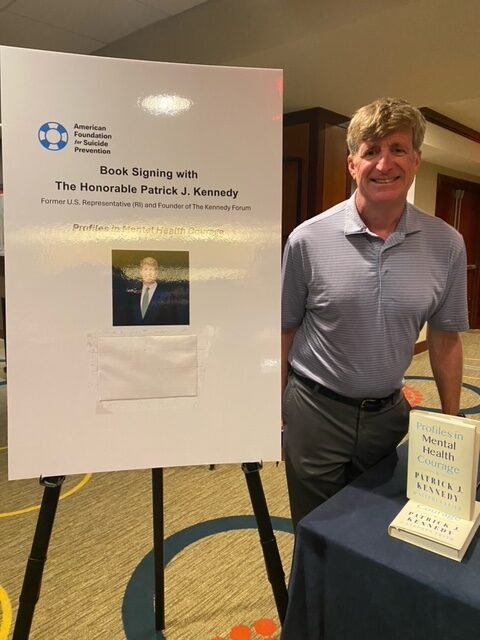
Denver Health
Denver Health and CEO Donna Lynne hosts Patrick J. Kennedy for a facility tour, reception, book signing and physicians group talk.
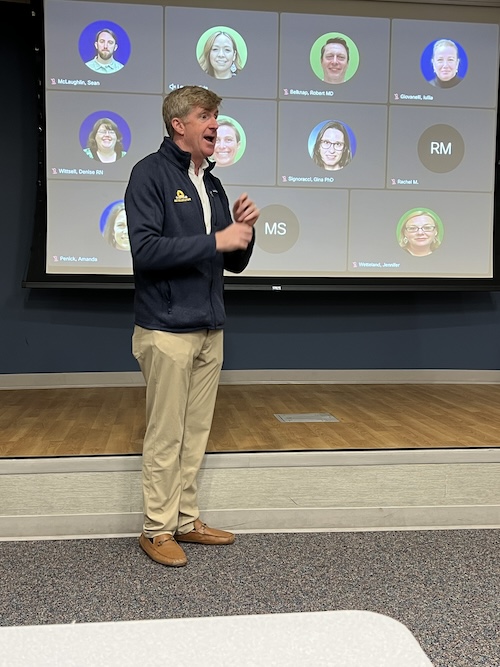
NAMICon
NAMICon, the annual convention is one of the biggest mental health summits where there is something for everyone whether you are living with a mental health condition, caring for someone who is, a NAMI grassroots leader, a mental health professional, or just starting on your mental health journey. Join Congressman Patrick J. Kennedy and Daniel H. Gillison Jr., NAMI National CEO, for Courageous Conversations: Navigating Mental Health and Advocacy. This plenary fireside chat will share Patrick’s personal journey through mental health challenges, drawing from his own experiences documented in his insightful books. From navigating the highs and lows of public life to confronting stigma and advocating for policy change, Congressman Kennedy has been at the forefront of the mental health movement. Together with Dan, they will explore the evolving landscape of mental health advocacy, highlighting the critical role of storytelling, policy advocacy, and community support in driving change.
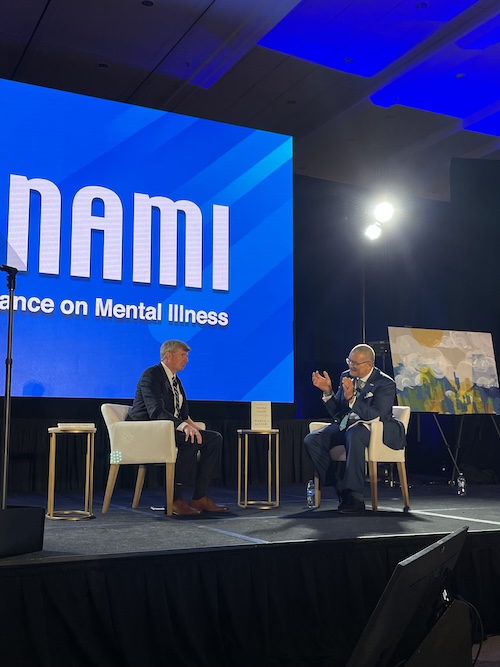
Indiana Youth Mental Health Roundtable Summit
Indiana Youth Mental Health Roundtable Summit hosted by Riley Children’s Hospital. Patrick and Lt. Governor Suzanne Crouch joined experts to raise children’s mental health awareness, the importance of policy, and need to focus on solutions.
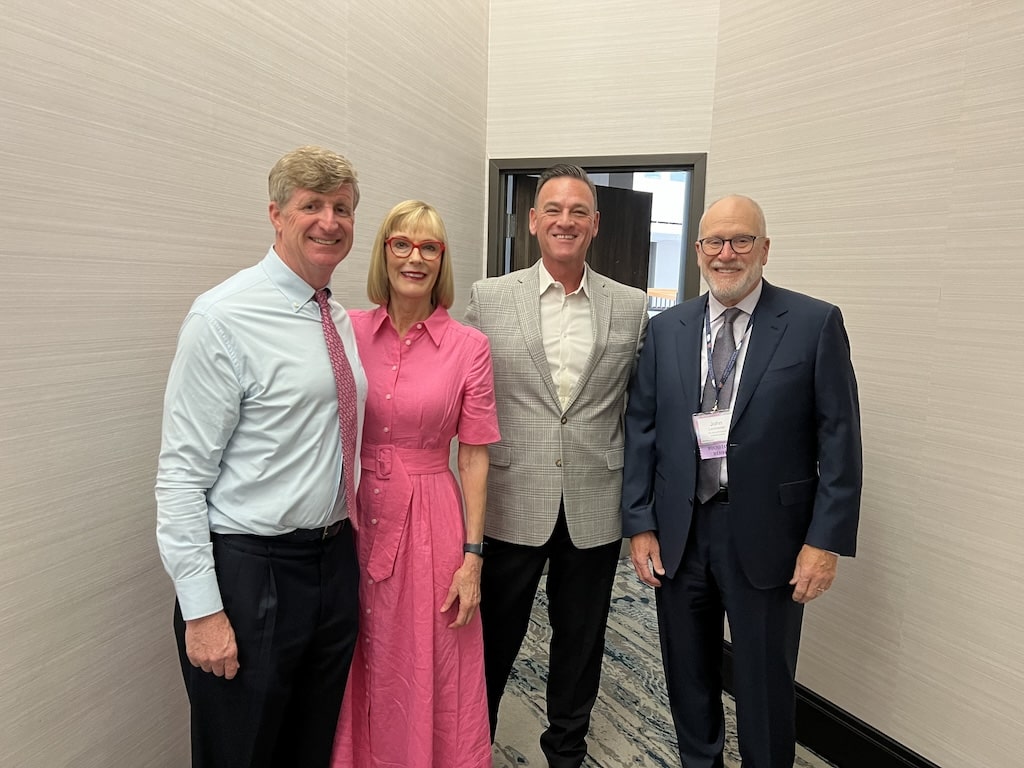
Recovery Leadership Summit
The Recovery Leadership Summit brings together key leaders, recovery advocates, and recovery community organizations (RCOs) from across the nation for networking and learning opportunities. Former Congressman Patrick J. Kennedy keynotes their June 5th plenary session about his new book, Profiles in Mental Health Courage, and parity.
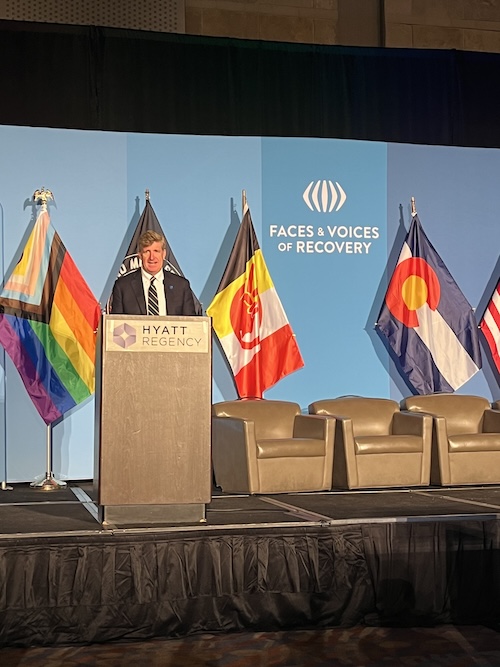
JED Foundation Gala
Patrick celebrates the incredibly distinguished advocacy career of Phil Satow, founder of the JED Foundation.
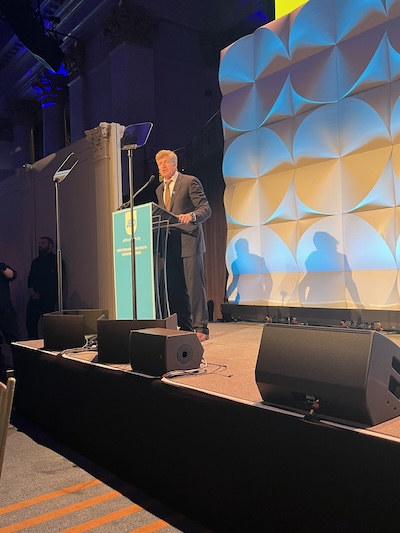
thINc360 The Healthcare Innovation Congress
Pamela Greenberg leads a fireside chat with Patrick J. Kennedy and Kristina Saffran to discuss eating disorders and status of mental health in America.
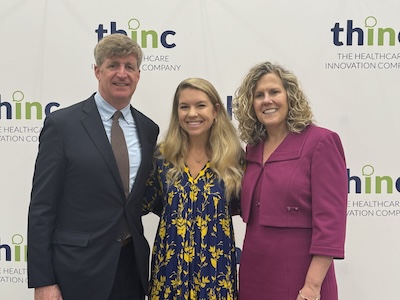
ABC News Live Prime with Linsey Davis
ABC News’ Linsey Davis speaks with Former Rhode Island Congressman Patrick J. Kennedy about his new book “Profiles in Mental Health Courage” and his endorsement of President Biden over cousin RFK Jr.

State of the Union with Dana Bash
Former Congressman Patrick J Kennedy discuss his new book Profiles in Mental Health Courage and the current political climate with CNN’s Dana Bash.
Patrick Kennedy endorses Joe Biden over his cousin RFK Jr.

Pizetta Media, Content with a Cause
Mike Van Zetta interviews Patrick J. Kennedy and Stephen Fried about their new book Profiles in Mental Health Courage.
UCLA Open Mind Event "Profiles In Mental Health Courage"
The Semel Institute, UCLA Open Mind Event “Profiles In Mental Health Courage” with The Honorable Patrick Kennedy in conversation with Jonathan Sherin, MD, PhD, former Director of the Los Angeles County Department of Mental Health, and Mark McMurrey whose son Harry is profiled in Patrick’s book.
MAY 2024 issue of Nantucket Magazine
Bruce Percelay, Chairman of the Edward M Kennedy Institute interviews Patrick J. Kennedy about America’s mental health crisis. Read article here.
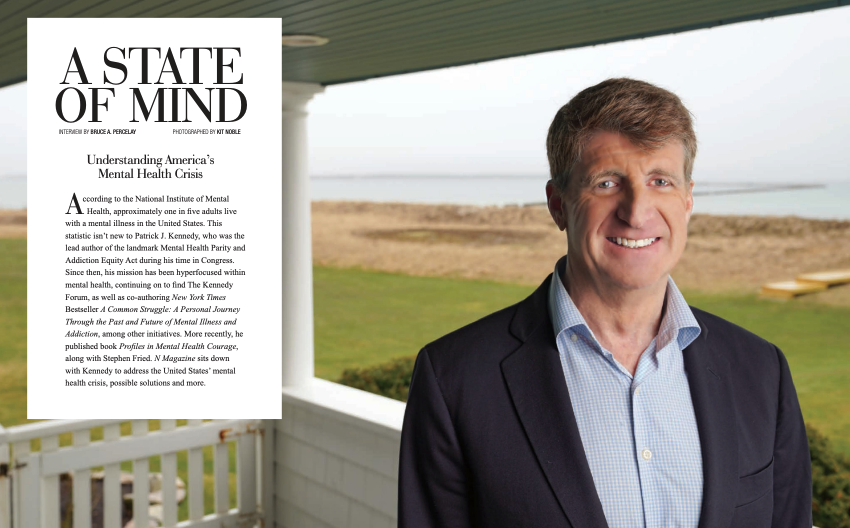
The Adversity Advantage with Doug
Patrick J. Kennedy is a former Congressman and one of the nation’s leading voices on mental illness and addiction policy, and the New York Times bestselling coauthor of A Common Struggle. During his sixteen years in Congress, he fought to end discrimination against mental health care, highlighted by lead sponsorship of the landmark Mental Health Parity and Addiction Equity Act. Patrick is the son of former Senator Ted Kennedy and the nephew of former president, John F Kennedy. Today on the show we discuss: why it’s not surprising to Patrick that so many people are suffering from mental health issues, why kids specifically are having such a hard time in todays society, what you personally can do to prevent mental health issues, the changes our healthcare needs to make to help with prevention and reduce the risk of mental health problems, what parents can do to help their kids reduce their risk of addiction and severe mental health issues, what Patrick thinks about the current drug epidemic we are facing, his overall thoughts on how we can fix everything and much more.
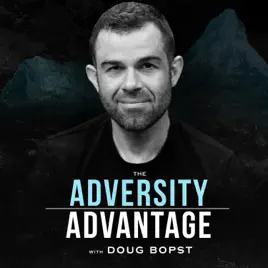
CBS Saturday Morning with Michelle Miller
Eighty-four million Americans had a mental disorder in 2022, while 34 million people had a substance use disorder. About 11 million people dealt with both, but many did not receive professional treatment, partially because of a persistent stigma leading to silence and shame around mental health problems. Michelle Miller reports on how former congressman Patrick J. Kennedy and author Stephen Fried are hoping to make change with their new book.
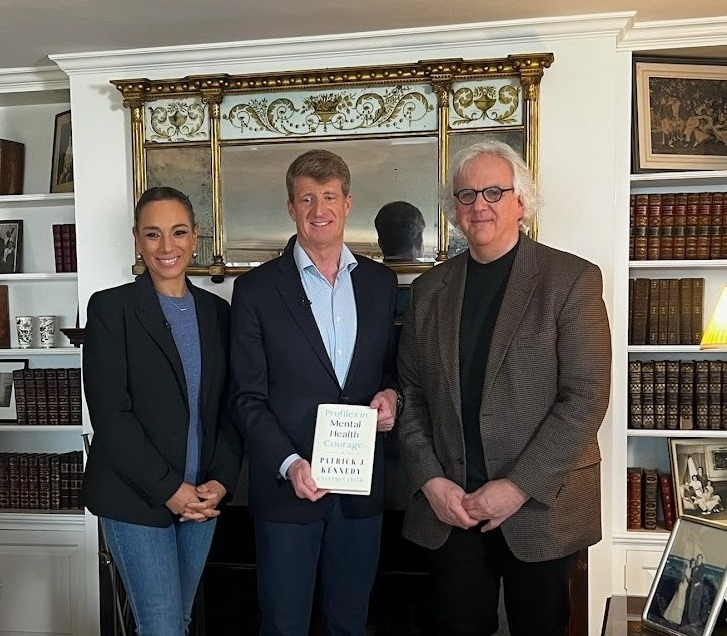
News Nation with Elizabeth Vargas
‘We don’t treat people until it’s almost too late’: Patrick Kennedy | Vargas Reports


APA (American Psychiatric Association) 2024 Annual Meeting
Patrick speaks at the annual meeting in New York and is joined by psychiatrists and stakeholders from all over the country.
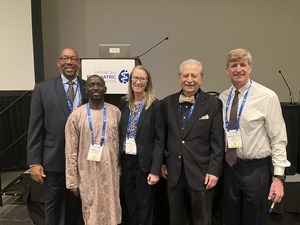
New York, Profiles in Mental Health Courage Event at Kenneth Cole
Kenneth Cole generously donated his New York showroom for an event with NBC’s Kate Snow, Patrick J. Kennedy, Stephen Fried and other Profile subjects to discuss Profiles in Mental Health Courage.


1674 Broadway - Times Square & Holland Tunnel Billboards!
Generous friends donate billboard space to The Kennedy Forum. Patrick J. Kennedy is joined by co-author, Stephen Fried, as well as Profile subjects, Gene Barduson, Mark McMurrey and Tonie Dreher to celebrate and speak out on mental health and parity. A crowd gathered to hear Patrick speak about what’s needed in mental health and addiction.
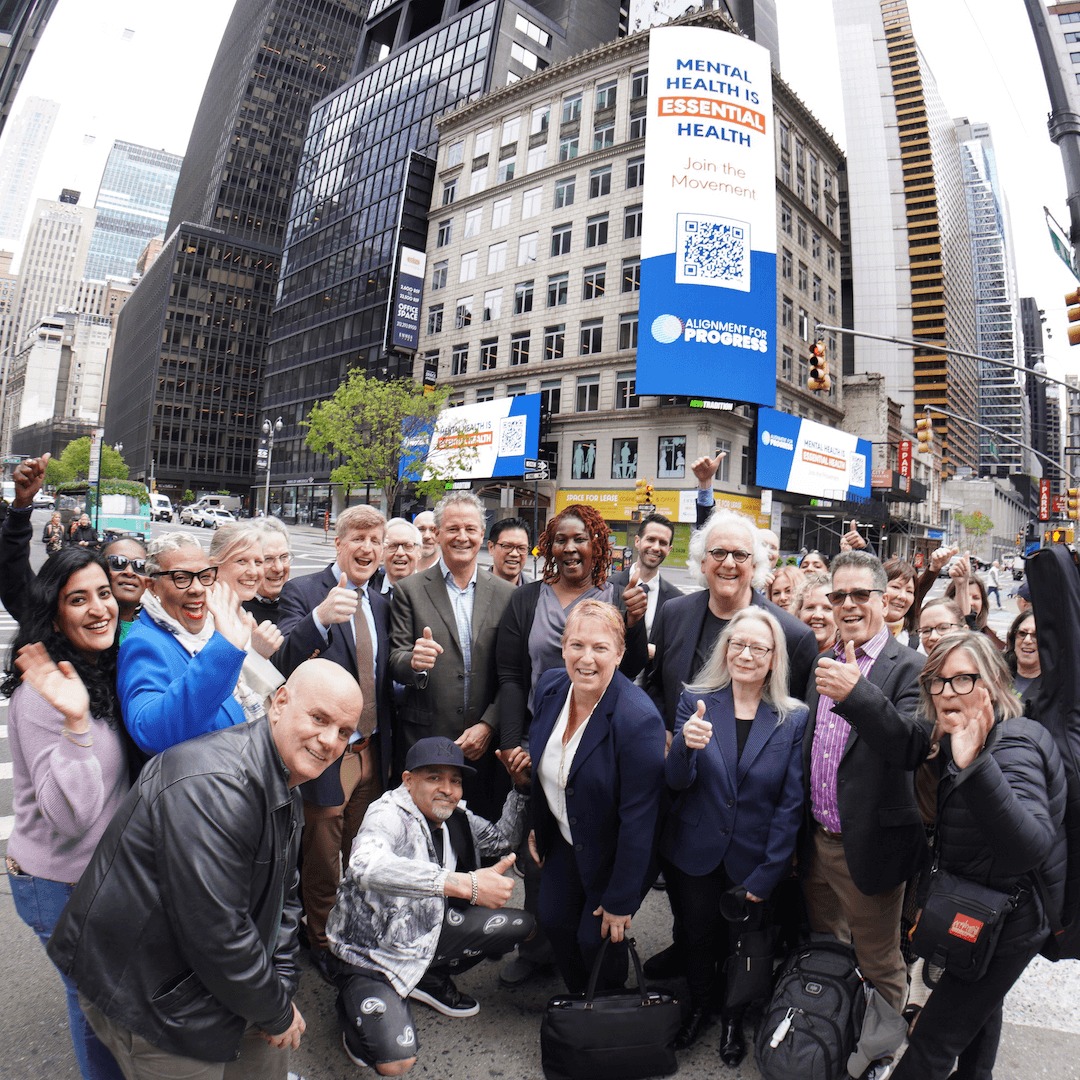
Washington DC, Profiles in Mental Health Courage Event
Katharine Weymouth, Megan Rupp and Timna Zucker generously host Patrick J. Kennedy, Stephen Fried and several Profiles subjects for book talk and signing.
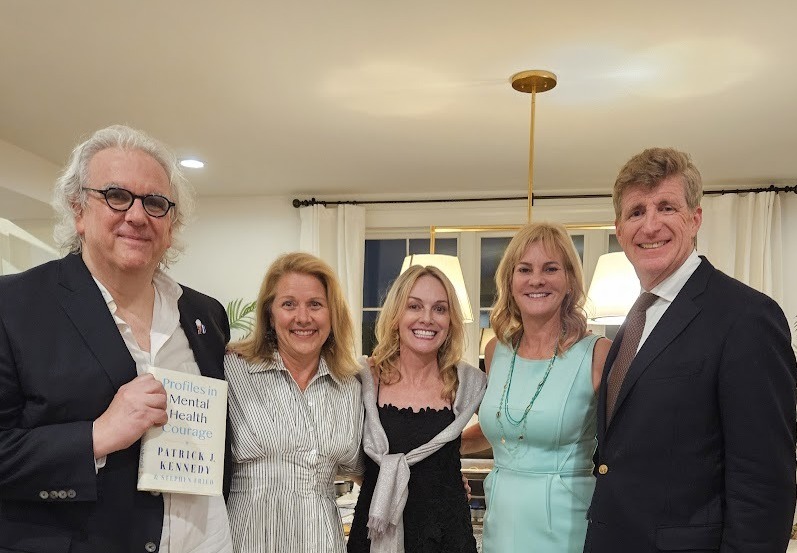
NBC News Daily
NBC News Kate Snow interviews Patrick J. Kennedy about his new book, Profiles in Mental Health Courage.

Psych Hub 5 Year Anniversary
Patrick J. Kennedy sits down with co-founder, Marjorie Morrison, and CEO, Scott Healy, of Psych Hub to discuss the last five years and what the future has in store for the company.
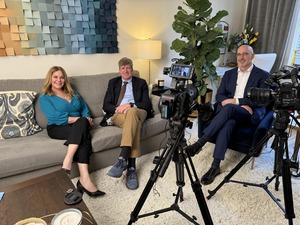
Healthsperien 10th Anniversary
Patrick celebrates Healthsperien’s 10th Anniversary in Washington, DC by attending the day long conference and reception celebrating this milestone.
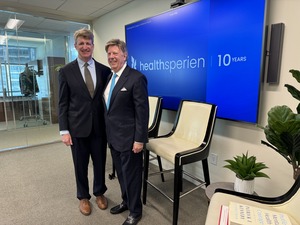
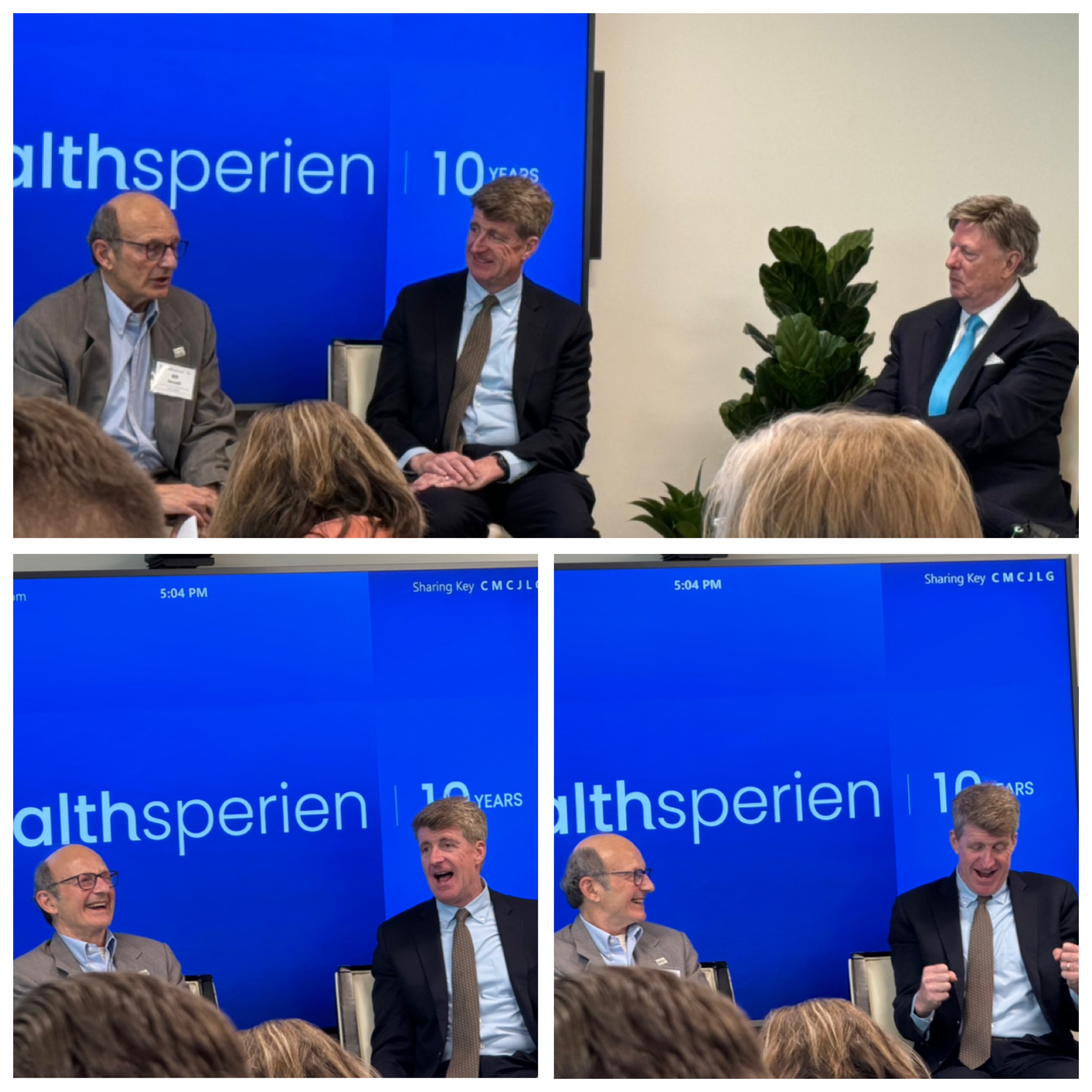
C-SPAN
Former Representative Patrick Kennedy (D-RI), co-author of Profiles in Mental Health Courage, talked about Americans who have struggled with mental illness and the stigma and silence that he says still surrounds it.
PBS Newshour
For former congressman Patrick J. Kennedy, advocating for mental health care is part of his family’s legacy. His uncle, President John F. Kennedy, signed the bill that established the nation’s community-based mental health care system. Ali Rogin sat down with Patrick Kennedy to discuss his new book, which details the mental health struggles and triumphs of everyday Americans.
Maria Shriver's Sunday Paper
We’re excited today because we’re going to talk about mental health courage. That’s right, mental health courage. And we’re going to talk with my cousin, Patrick Kennedy. This is his new book. It’s a little bit tagged up by my little notes here, but it’s really great, and he’s really great, and he’s doing all kinds of stuff. We’re going to talk about this book. It just came out today. And I got an exclusive interview with Patrick. And it’s great. It’s called Profiles in Mental Health, Courage. And I’m super proud of him. And I’m super proud of all the people who allow their stories to be told in this book. They’re super inspiring. They’re super inspiring, and he redefined what it means to have courage. Hi, Patrick. How are we?
Good Morning America (GMA3)
May is Mental Health Awareness Month and Patrick J. Kennedy, author and former congressman, discusses his new book, “Profiles in Mental Health Courage.”

A Conversation with Patrick J. Kennedy & Rich Dorment, Editor in Chief, Men's Health, Hearst Magazine’s
Hearst employees gather at the Hearst Tower in New York for a discussion with Patrick J. Kennedy and Rich Dormant, about Patrick’s new book, Profiles in Mental Health Courage.

Release of "Profiles in Mental Health Courage"
Patrick Kennedy & co-author, Stephen Fried, release “Profiles in Mental Health Courage” portraying the dramatic journeys of a diverse group of Americans who have struggled with their mental health. This book offers deeply compelling stories about the bravery and resilience of those living with a variety of mental illnesses and addictions.
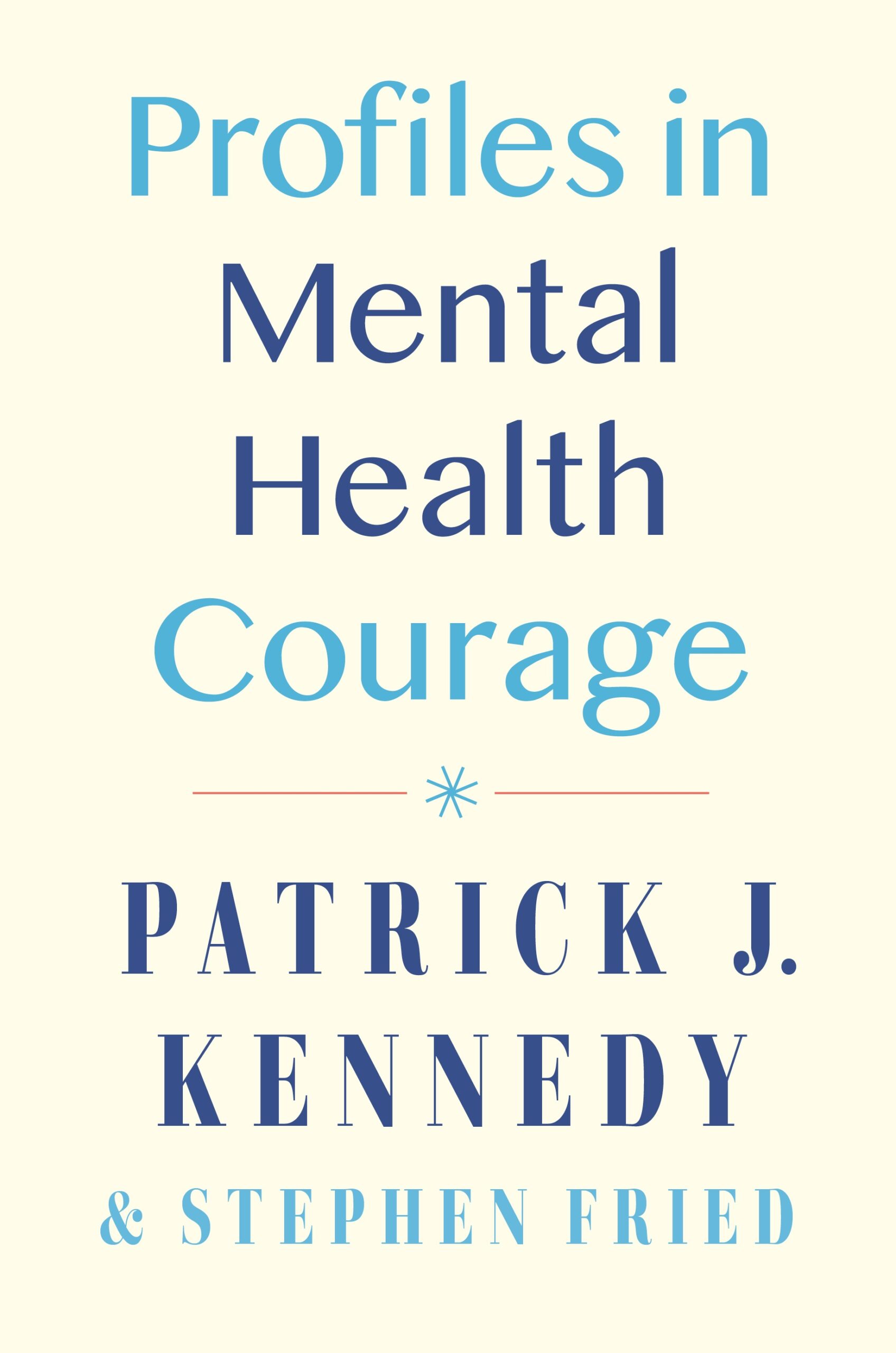
CBS Saturday Morning with Michelle Miller
Michelle Miller interviews Patrick J. Kennedy and co-author, Stephen Fried, about their new book Profiles in Mental Health Courage, at the Kennedy Family Compound in Hyannis, MA.
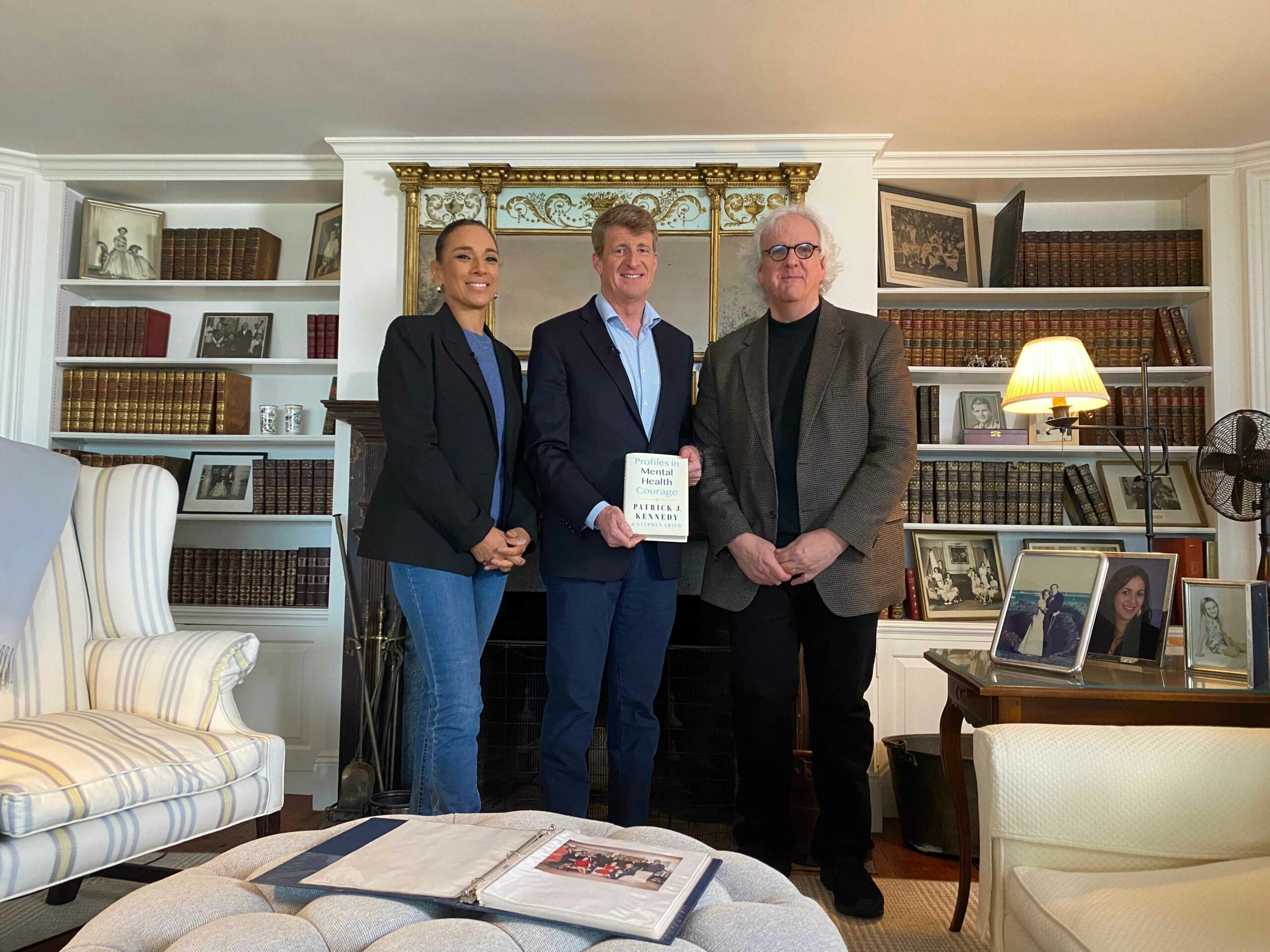
Edward M. Kennedy Institute Annual Dinner
Former Representative Joe Kennedy III, former Representative Patrick J. Kennedy, and Ambassador Victoria Reggie Kennedy present Governor Chris Sununu (R-NH) with the Award for Inspired Leadership.
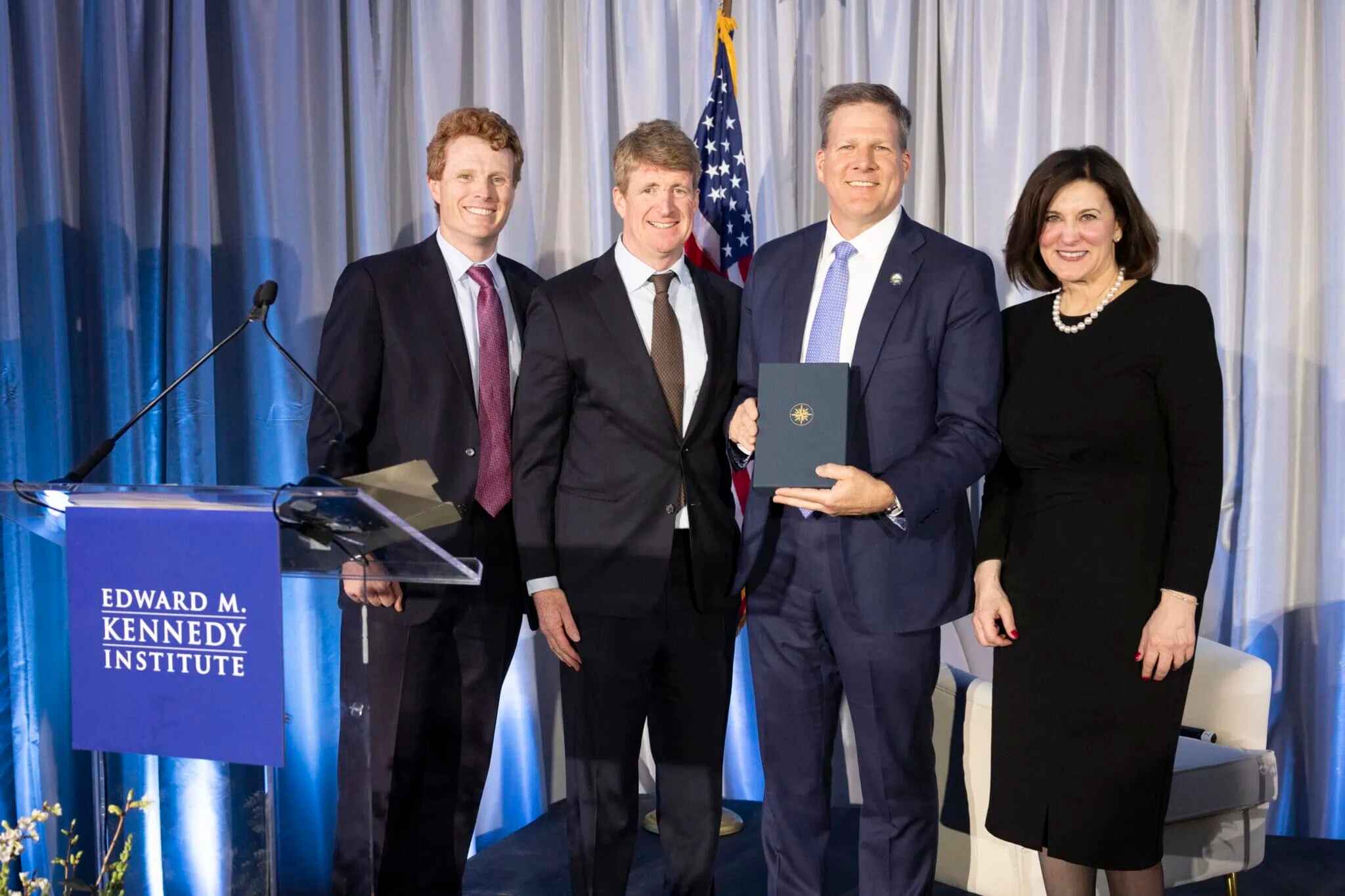
St. Patrick's Day at the White House
Patrick, Amy, and their children, Harper, Owen, Nora, Nell, and Marshall attend the White House
St. Patrick’s Day Celebration in honor of His Excellency Leo Varadkar, Taoiseach of Ireland.

Chicago St. Patrick's Day Parade
Peter J. O’Brien, co-founder of The Kennedy Forum Illinois, and CEO of MADO Healthcare serves as the 69th Grand Marshal for the Chicago St. Patrick’s Day Parade. Patrick Kennedy is the special guest and The Kennedy Forum is the named charity.
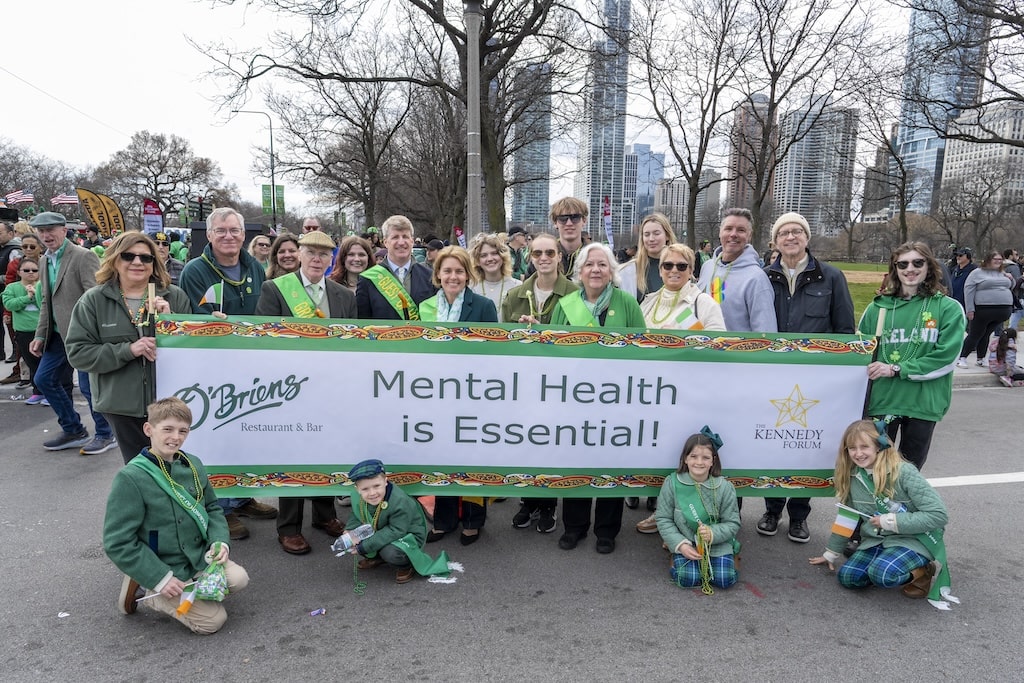
Alexandria - The Kennedy Forum Health Care Summit
The Kennedy Forum and Alexandria Summit host the 2nd Annual Alexandria-Kennedy Forum Health Care Summit in Washington, DC. LizFowler, Ph.D., J.D., Deputy Administrator and Director of the Center for Medicare and Medicaid Innovation (CMS Innovation Center) joins for a fireside chat.
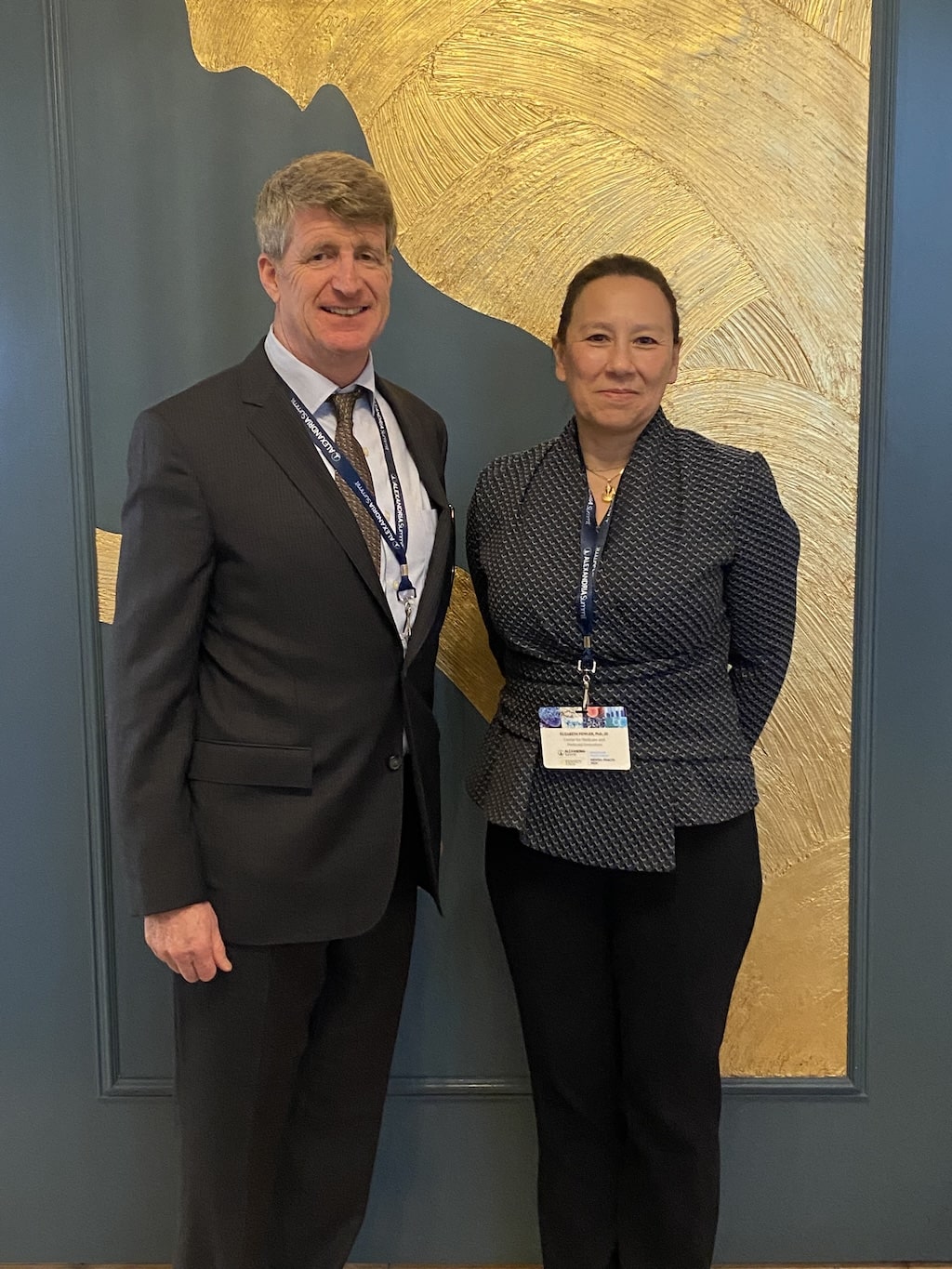
Partner, Healthsperien
Patrick joins Healthsperien, as a Partner, to lead their national mental health and addiction policy practice.

JFK’s nephew has a fix for our mental health
Washington Post details the Alignment for Progress movement to make mental health care accessible to all.
90/90/90 by 2023!
Patrick calls for “90/90/90 by 2023!” A goal to have 90% of all individuals screened for mental and substance use disorders, 90% of those in need able to receive evidence-based treatment, and 90% of those receiving treatment able to manage their symptoms in recovery.
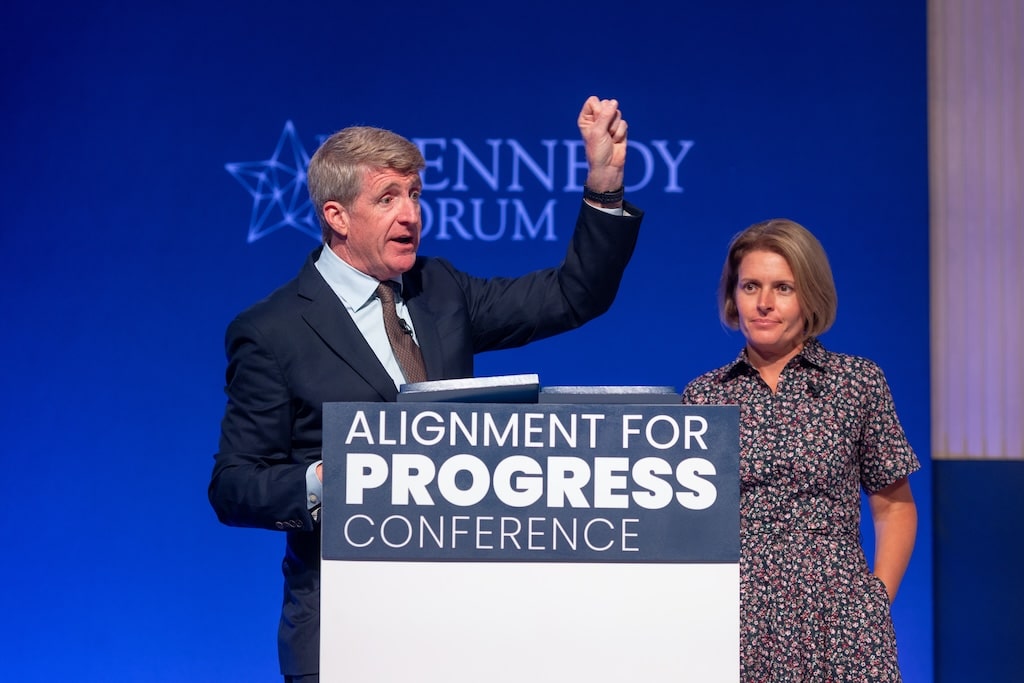
Launch of Alignment for Progress
Patrick and The Kennedy Forum launch the Alignment for Progress, a National Strategy for Mental Health and Substance Use Disorders, a dynamic resource for federal policymakers that lays the groundwork for a community system of care and defines a shared path forward toward better mental health and substance use care for all.

Department of Labor, ERISA
Patrick testifies on parity before the US Department of Labor, Employee Retirement Income Security Act (ERISA).
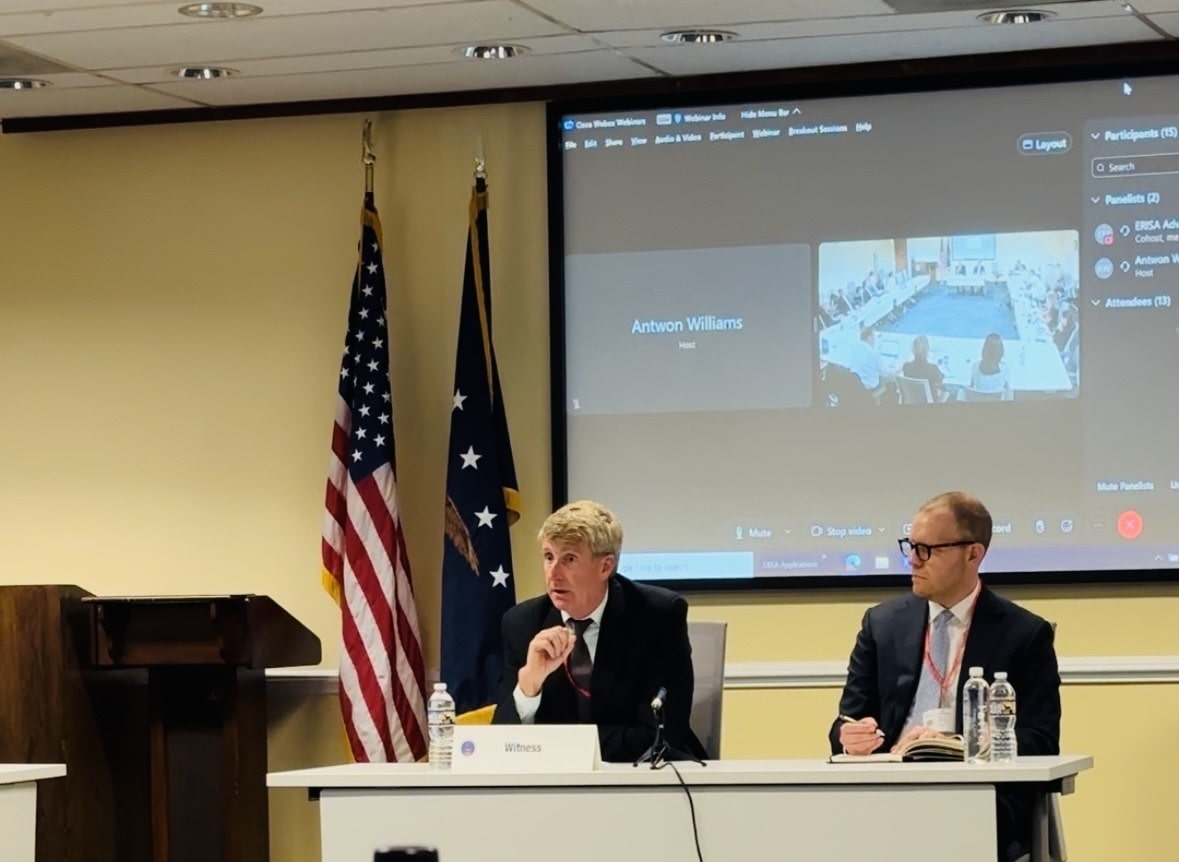
White House Event
Patrick, Amy, Owen, Nora, Nell & Marshall attend White House event: Improving Access to Mental Health.
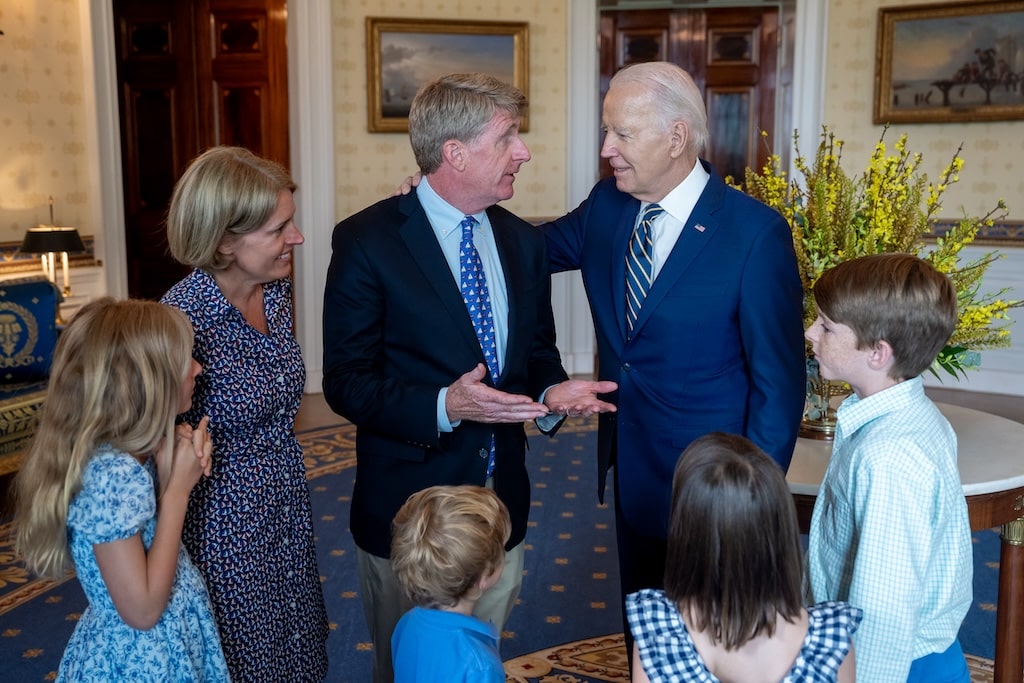
NGA
Patrick and Amy host seventeen sitting Governors at their home in New Jersey to discuss youth mental health.

White House Event
Patrick attends White House event: Celebration of Passing the Bipartisan Safer Communities Act.

US Department of Labor Roundtable
Patrick participates is a roundtable discussion at the US Department of Labor Roundtable with Secretary Marty J. Walsh and Ali Khawar, Acting Assistant Secretary of the Employee Benefits Security Administration (EBSA) focused on access to treatment, health insurance coverage, workforce training and development, and how to improve outcomes for mental health, recovery, and suicide prevention.
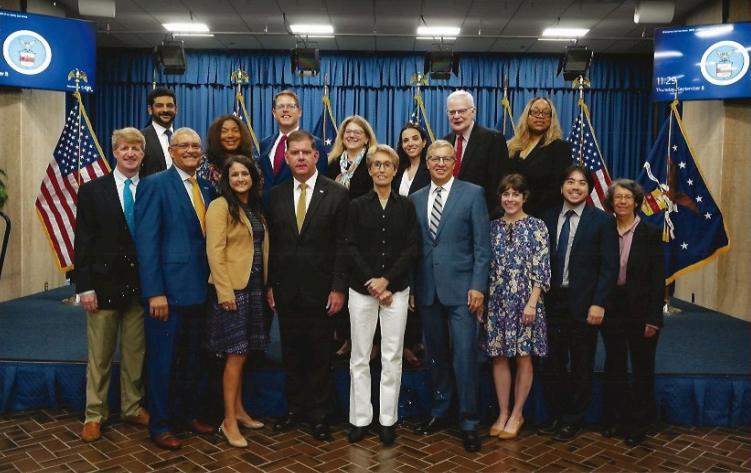
Webinar with Secretary of Health & Human Services Xavier Becerra
Patrick and The Kennedy Forum host Secretary of Health & Human Services Xavier Becerra for a webinar discussion Mental Health and Addiction Parity: Ensuring Equal Coverage in Medicaid and Marketplace Plans.

White House Event
Patrick speaks at White House event: Hiding in Plain Sight: Youth Mental Illness.
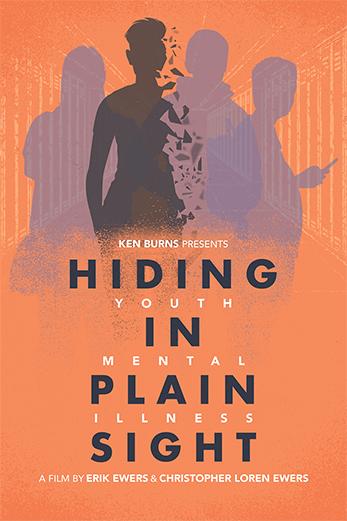
School Based Mental Health Webinar
Amy and The Kennedy Forum hosted a webinar: School Based Mental Health: a National Priority with Katherine Neas, deputy assistant secretary in the Office of Special Education and Rehabilitative Services at the United States Department of Education.
Delaware Lt. Governor’s Youth Mental Health Roundtable
Delaware Lt. Governor Bethany Hall Long hosted a roundtable discussion with Patrick, Amy and others around education and mental health.
Webinar with Secretary of Labor Marty J. Walsh
Patrick and The Kennedy Forum host Secretary of Labor Marty J. Walsh for a webinar discussion Understanding Parity Enforcement.
Patrick serves on the Biden Health Care Committee
CEO Huddle
Patrick joins in the CEO Huddle with other CEOs from key mental health organizations across the country to develop a unified vision for transforming mental health and substance use care to improve the lives of people living with these conditions through a transformed system of care.
Co-Chair National Response to COVID-19
Patrick co-chairs the Action Alliance’s National Response to COVID-19, which brings together public and private sectors to lead a coordinated mental health and suicide prevention response with Dr. Joshua A. Gordon, M.D., Ph.D., Director of the National Institute of Mental Health (NIMH)
Agenda for Change: Unite, Connect, Act
Patrick and The Kennedy Forum host Agenda for Change: Unite, Connect, Act; in the Kennedy Caucus Room at the US Capitol, Washington, DC. Featured speakers included Andy Slavitt, former interim administrator of the Centers for Medicare and Medicaid Services; Congressman David Trone (D-MD); former Senator Gordon Smith (R-OR); and Congresswoman Judy Chu (D-CA).
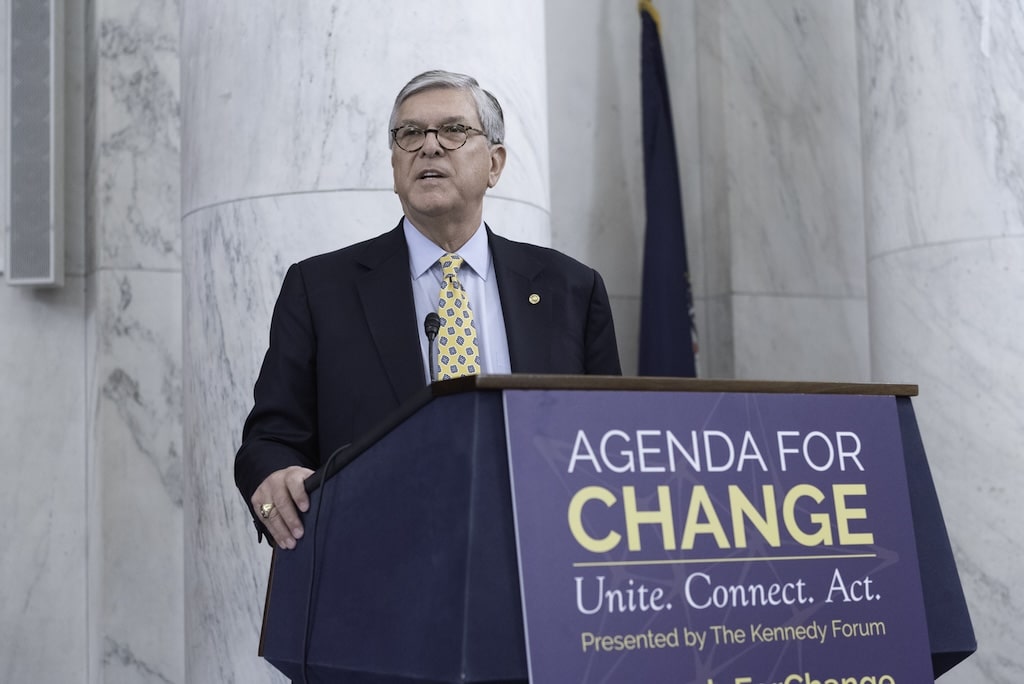
Connecticut Mental Health Parity Law
Patrick joins Governor Ned Lamont for the signing of the Connecticut Mental Health Parity Law.
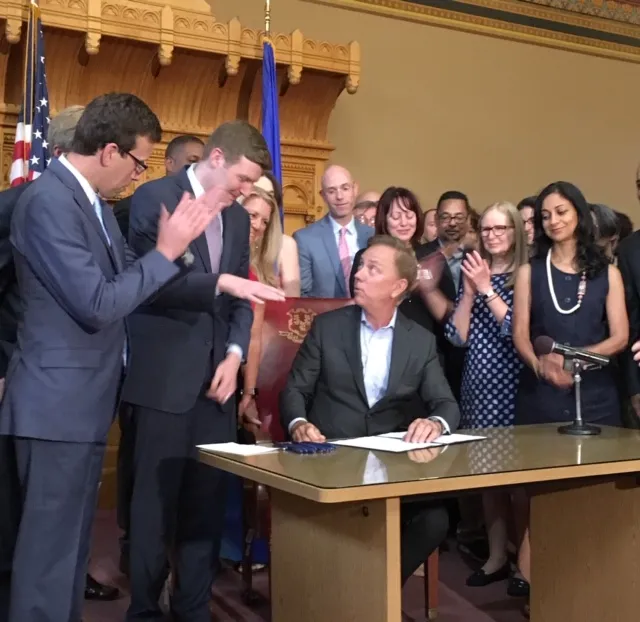
New Jersey Parity Bill (A2031/S1339) Signing
Patrick joins Governor Phil Murphy, Assembly Speaker Craig Coughlin, and Senate Republican Leader Tom Kean for the signing of New Jersey Parity Bill (A2031/S1339). The signed legislation will enhance enforcement of mental health parity laws by improving transparency and accountability related to the insurance coverage of mental health and substance use disorder treatment services for New Jersey residents. The law requires health insurers to provide coverage for mental health conditions and substance use disorders under the same terms and conditions as provided for any other sickness and to meet the requirements of the Paul Wellstone and Pete Domenici Mental Health Parity and Addiction Equity Act. The federal law enacted in 2008 requires equal coverage for mental and physical health care services.

The Kennedy Forum Illinois, Working Well: Innovative Strategies for Workplace Well Being
Patrick and Peter J. O’Brien host The Kennedy Forum Illinois, Working Well: Innovative Strategies for Workplace Well Being in Chicago, IL. Featured speakers included Governor JB Pritzker, Richard Trumka, President AFL-CIO; American television journalist Kate Snow; Lonnie Stephenson, President IBEW; Kwame Raoul, Illinois attorney general; and New York City’s First Lady, Chirlaine McCray.
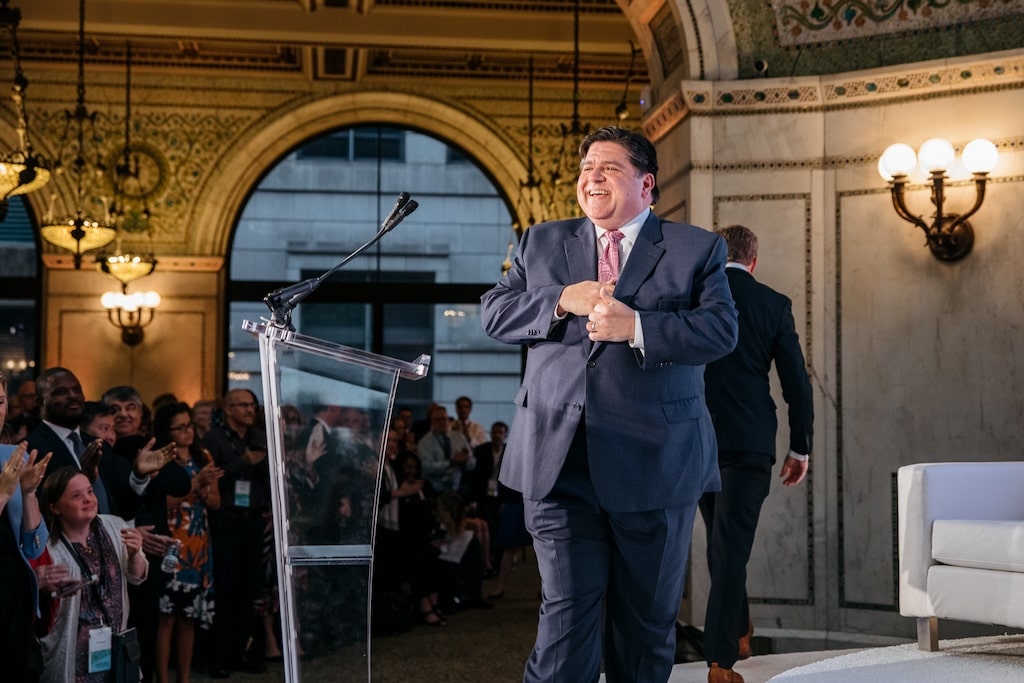
Mental Health for US
Patrick co-chairs Mental Health for US, with former U.S. Senator Gordon Smith (R-OR), a nonpartisan initiative designed to elevate mental health and addiction in policy conversations during the 2020 election cycle
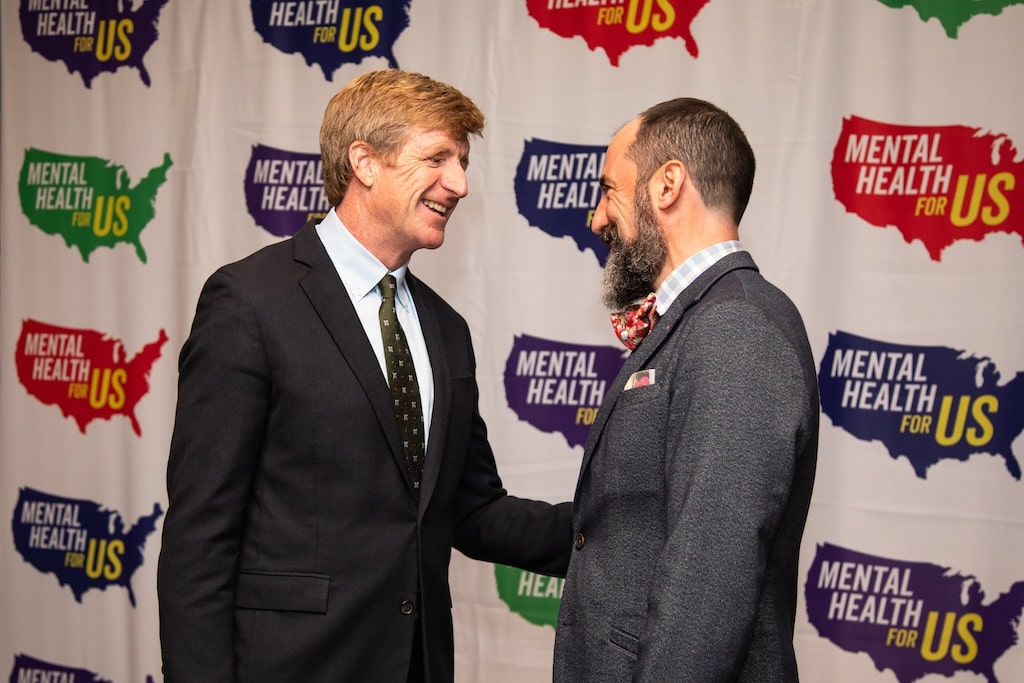
Connecticut Parity Hearing
Patrick testifies before the Connecticut House on parity.
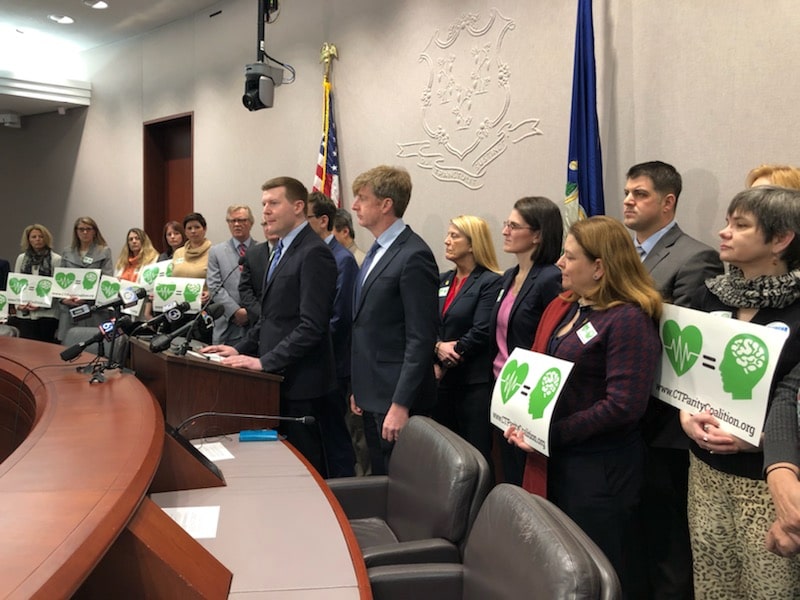
10th Anniversary of the Mental Health Parity and Addiction Equity Act (MHPAEA)
Patrick, former US Surgeon General Dr. David Satcher, The Kennedy Forum and Kennedy-Satcher Center for Mental Health Equity host the 10th Anniversary of the Mental Health Parity and Addiction Equity Act (MHPAEA) in the Kennedy Caucus Room at the US Capitol, Washington, DC. Featured speakers included former Senator Chris Dodd (D-CT), Elinore F. McCance-Katz, MD, PhD, Assistant Secretary of Health and Human Services for Mental Health and Substance Use; former Surgeon General Vivek Murthy; New York City’s First Lady, Chirlaine McCray; Senator Chris Murphy (D-CT); Senator Jack Reed (D-RI); Senator Debbie Stabenow (D-MI); and Senator Sheldon Whitehouse (D-RI).
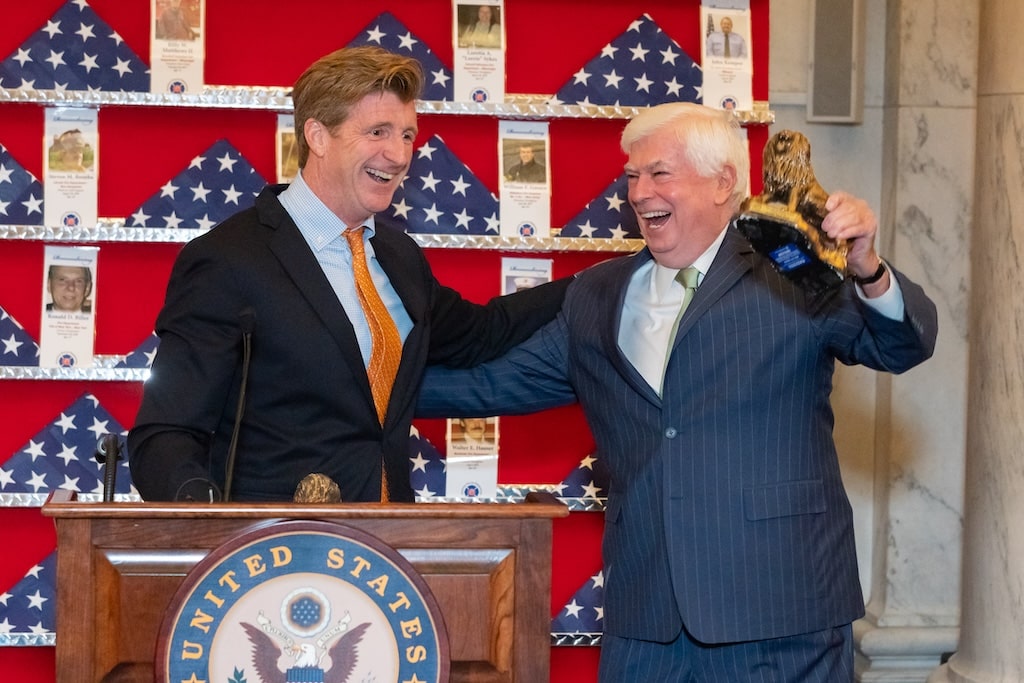
Delaware Parity Bill SB230 Signing
Patrick joins Governor John Carney, Lt. Governor Bethany Hall-Long, State Senator Bryan Townsend and advocates for the signing of Delaware Parity Bill SB239.
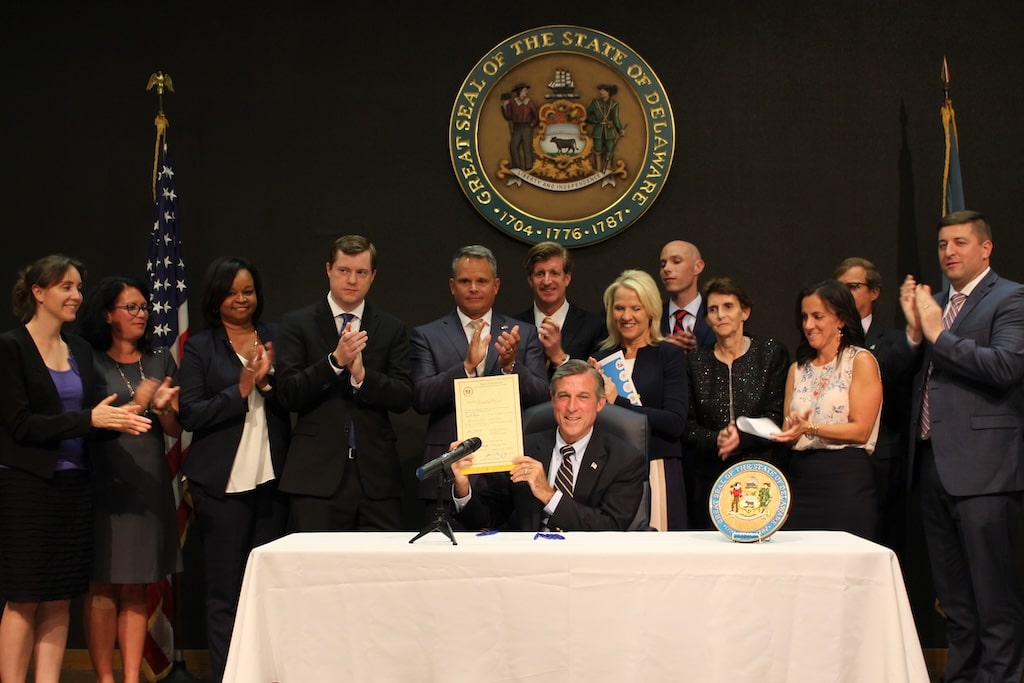
White House Event
Patrick attends White House Opioid Event: A Year of Historic Action to Combat the Opioid Crisis.

Rhode Island Executive Order about Mental Health and Addiction Recovery
Patrick joins Governor Gina Raimondo in Rhode Island for the signing of an Executive Order about Mental Health and Addiction Recovery focusing on parity and access to care.
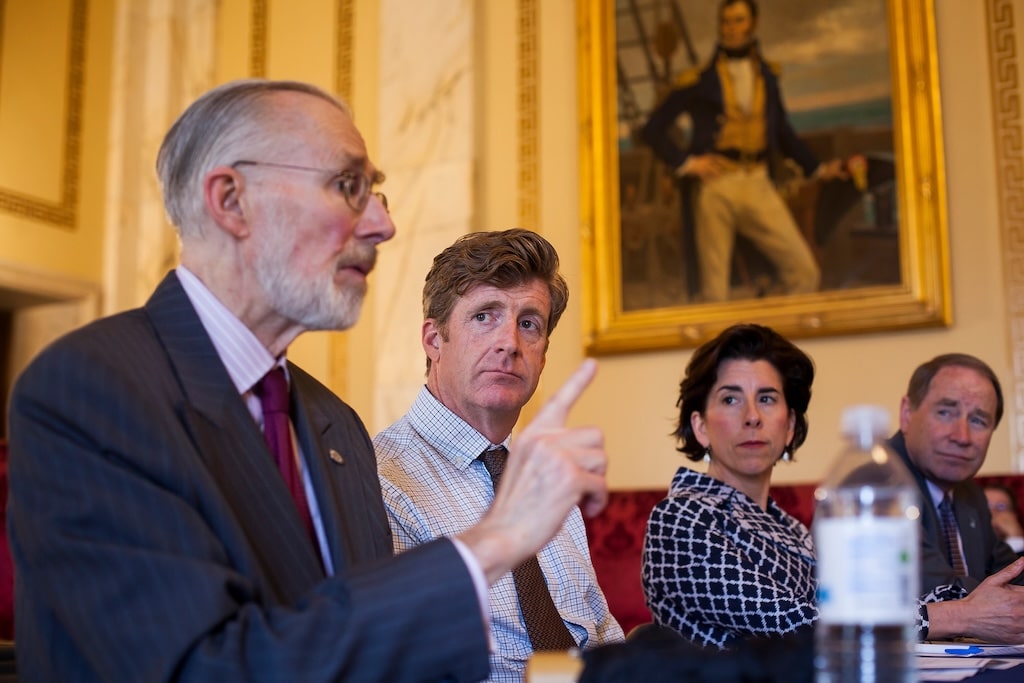
Co-Founded Psych Hub
Patrick co-founded Psych Hub, with Marjorie Morrison, the most comprehensive online learning platform on mental health, substance use, and suicide prevention topics in the world.

Don't Deny Me
Patrick and The Kennedy Forum establish DontDenyMe to ensure consumers know their right to receive equal access to mental health and addiction treatment services.
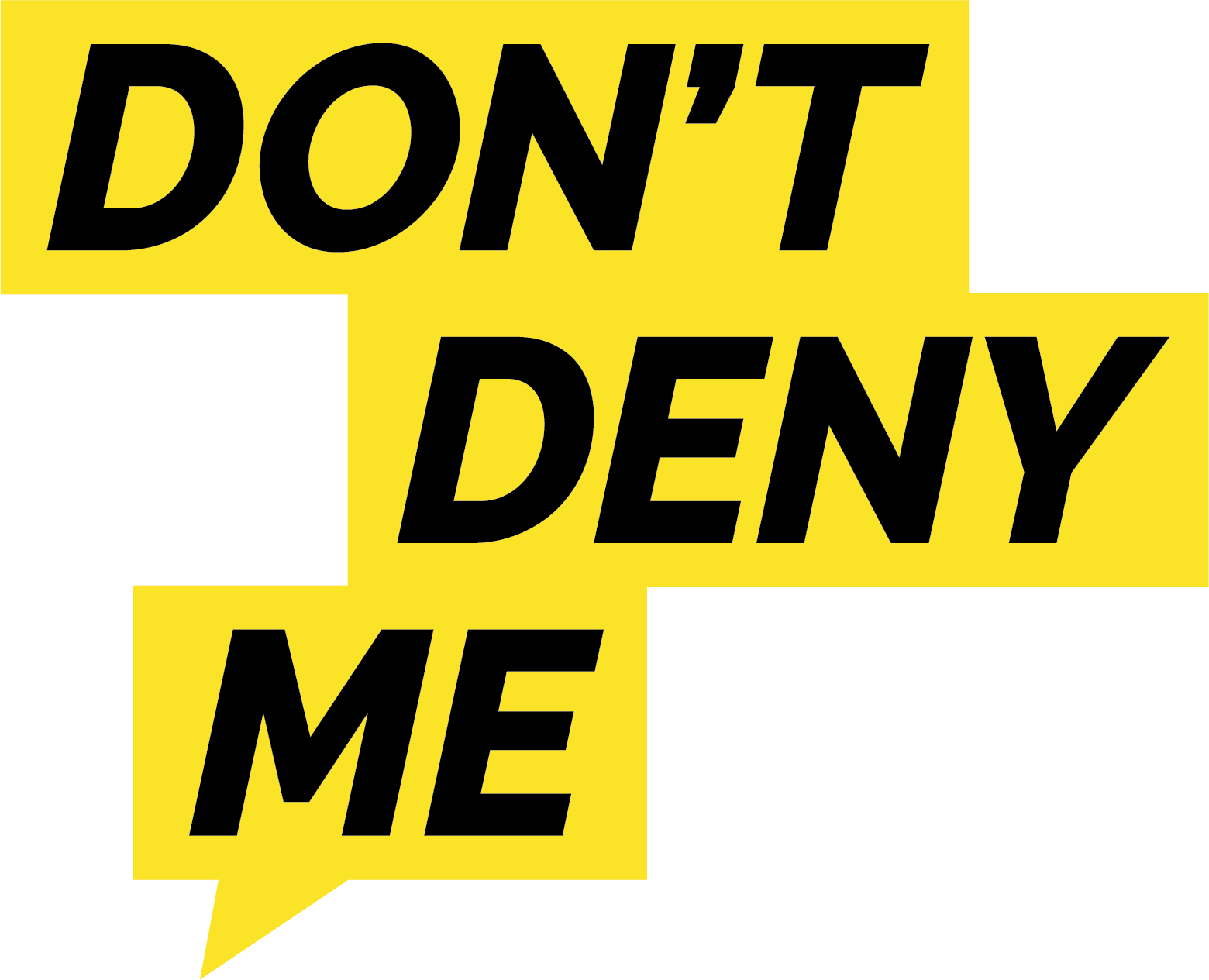
The Kennedy Forum Illinois, Bending Towards Justice: A Summit for Mental Health Equity
Patrick and Peter J. O’Brien host The Kennedy Forum Illinois, Bending Towards Justice: A Summit for Mental Health Equity, in Chicago, IL. Featured speakers included David Axelrod; New York City’s First Lady, Chirlaine McCray; Olympic Gold Medalist Michael Phelps; and former US Secretary of Education Arne Duncan.

Testimony, Joint Hearing between the LHHS Subcommittee and the Commerce, Justice, Science (CJS) Subcommittee
Senator Roy Blunt on the U.S. Senate Appropriations Committee as Chairman of the Labor, Health and Human Services and Education (LHHS) Subcommittee, held a hearing on the opioid epidemic. Patrick testified as a member of the President’s Commission on Combatting the Drug Addiction and the Opioid Crisis. Other witnesses included: Dr. Francis Collins, Director, National Institutes of Health; Dr. Elinore McCance-Katz, Asst. Secretary for Mental Health and Substance Abuse, Substance Abuse and Mental Health Services Administration; Dr. Anne Schuchat, Principal Deputy Director, Centers for Disease Control and Prevention; Robert Patterson, Acting Administrator of the Drug Enforcement Administration and Alan Hanson, DOJ Office of Justice Programs.
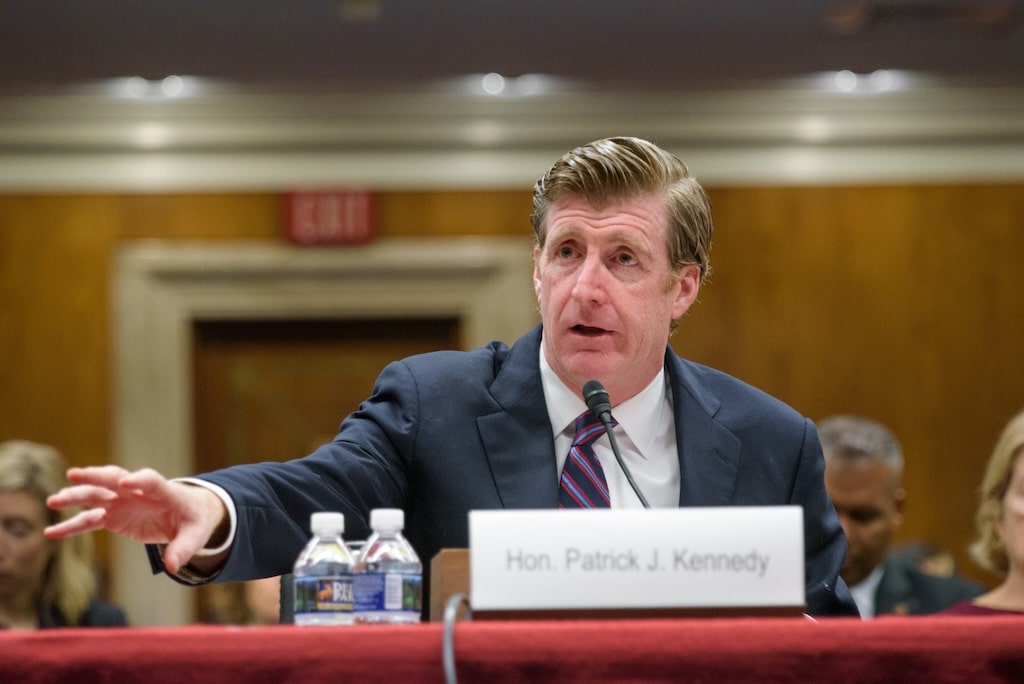
ParityPAC
Patrick and former Congressman Jim Ramstad (R-MN) form ParityPAC a Federal Leadership PAC to support federal candidates who are taking a leadership role in advancing mental health equity, regardless of party affiliation.
President’s Commission on Combating Drug Addiction and the Opioid Crisis
Patrick J Kennedy serves on the President’s Commission on Combating Drug Addiction and the Opioid Crisis. His personal contributions to the final report focused on the declaration of a federal emergency and strong parity-based recommendations.
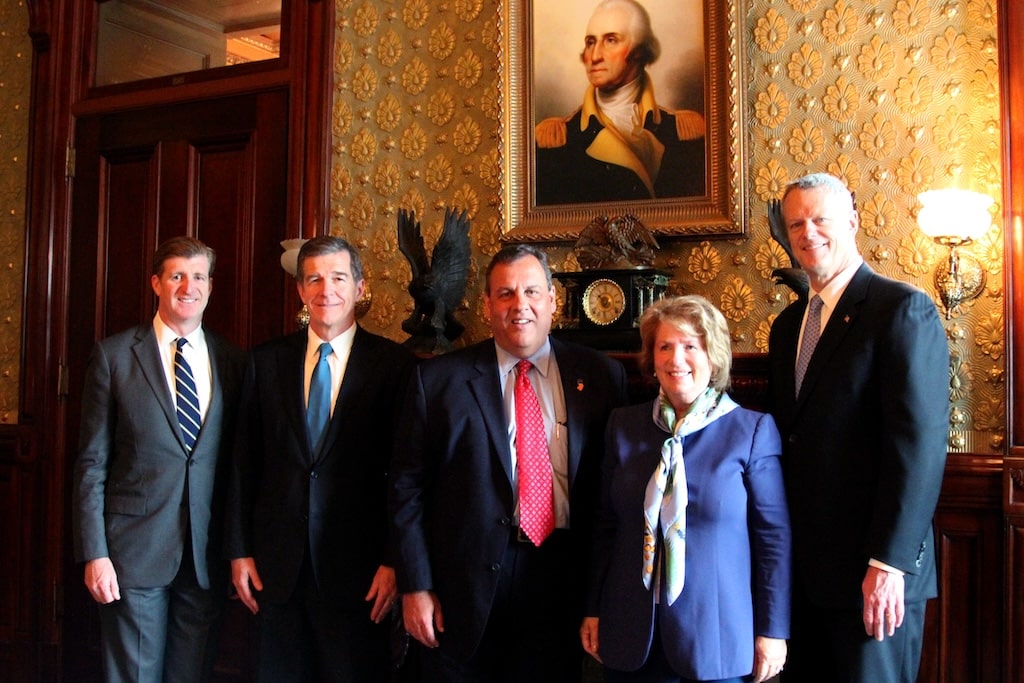
White House Event
Patrick attends White House event the Future of Health Care in America, A Discussion with President Barack Obama, Vox’s Ezra Klein and Sarah Kliff.

New Frontier of Mental Health & Addiction
Patrick hosts the New Frontier of Mental Health & Addiction in the Kennedy Caucus Room at the US Capitol, Washington, DC. Featured speakers included Speaker Nancy Pelosi (D-CA); Senator John McCain (R-AZ); Congressman Joseph Kennedy III (D-MA); former US Surgeon General Dr. David Satcher; Dr. Nora Volkow, Director of NIDA; US Surgeon General Dr. Vivek Murthy, MD, MBA; Senator Ed Markey (D-MA); Congressman Fred Upton (R-MI); and Senator Gordon Whitehouse (D-RI). Attendees included Dr. Joshua A. Gordon, MD, PhD, Director of NIMH; Dr. Francis Collins, MD, PhD, Director of NIH; Diana W. Bianchi, M.D., Director, Eunice Kenney Shriver National Institute of Child Health and Human Development.
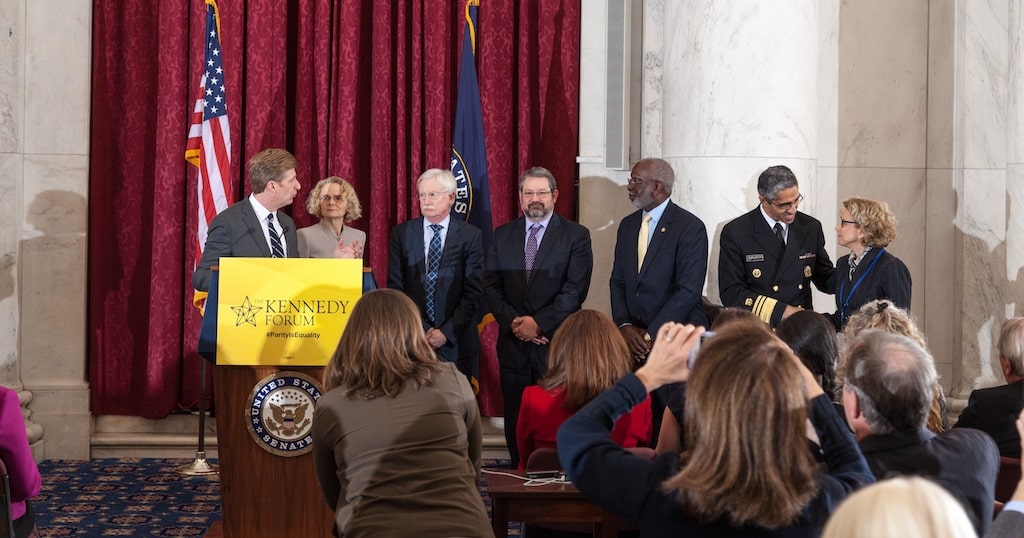
Surgeon General’s Report on Alcohol, Drugs, and Health
Patrick joins for the release of Surgeon General Vivek Murthy Report on Alcohol, Drugs, and Health which addresses the prevalence of alcohol, illicit drugs, and prescription drug misuse in the United States. The report covers neurobiology, prevention, treatment, recovery, health systems integration, and recommendations for the future.
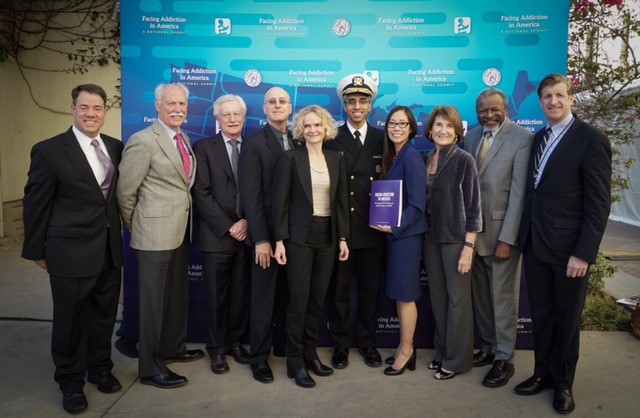
The Kennedy Forum Illinois Forum, Young Minds: Building Resilience & Well Being for the Next Generation
Patrick and Peter J. O’Brien host The Kennedy Forum Illinois Forum, Young Minds: Building Resilience & Well Being for the Next Generation; in Chicago, IL. Featured speakers included Elizabeth Vargas, ABC News; Allison Schmitt, Olympic Medalist; Michelle Williams; and US Surgeon General Vivek Murthy.

21st Century Cares Act
Patrick attends The 21st Century Cares Act Signing at the White House.
Democratic National Convention
Patrick and Amy attend the Democratic National Convention in support of presidential candidate Hillary Clinton in Philadelphia, PA.

White House Event
Patrick attends the White House Making Health Care Better series, Suicide Prevention.

Advocates for Opioid Recovery (AOR)
Advocates for Opioid Recovery (AOR) recruits former House Speaker Newt Gingrich, former U.S. Congressman Patrick J. Kennedy and CEO of the REFORM Alliance Van Jones to create a bipartisan initiative focused solely on promoting evidence-based treatment for OUD in order to help more people become long-term opioid addiction survivors.
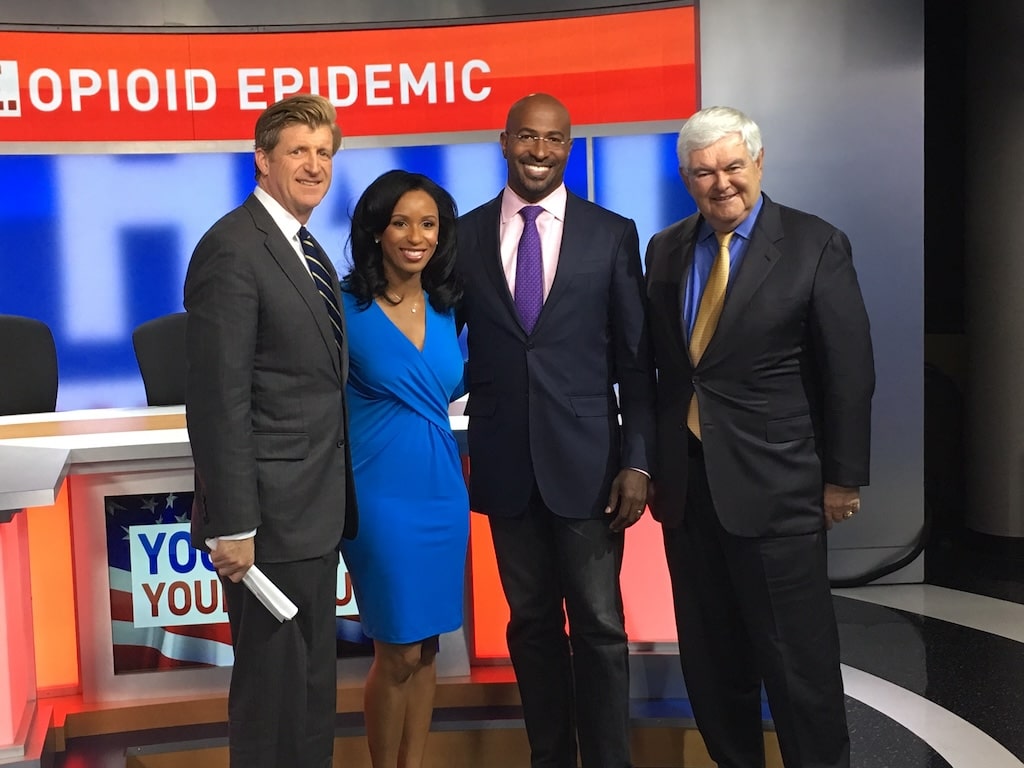
2nd Annual State of the Union in Mental Health and Addiction
Patrick and former US Surgeon General Dr. David Satcher host the 2nd Annual State of the Union in Mental Health and Addiction in Washington, DC.
The Kennedy Forum Illinois 2nd Annual Forum & Gala: A New Paradigm
Patrick and Peter J. O’Brien host The Kennedy Forum Illinois 2nd Annual Forum & Gala: A New Paradigm. Featured speakers included Kana Enomoto, Acting Assistant Secretary for Mental Health and Substance Use, SAMHSA, As Principal Deputy Administrator; former US Surgeon General Dr. David Satcher, Carrie Fisher, actress and mental health advocate; Senator Dick Durbin (D-IL); Senator Mark Kirk (R-IL); Mayor Rahm Emanuel; and Governor Bruce Rauner.

White House Education Discussion
Patrick and Amy attend an intimate discussion with Vice President Joseph Biden at the White House on the Jesse Lewis Empowering Educators Act.
The Kennedy Forum National Conference
Patrick hosts The Kennedy Forum National Conference in Boston featured speakers included Dr. Nora Volkow, Director, NIDA; former Senator Gordon Smith (R-OR); Mayor Marty Walsh, City of Boston; Martin Luther King III; actor Wayne Brady; and former Speaker Newt Gingrich.
Dedication, Edward M. Kennedy Institute
The Kennedy Family hosts the dedication of the Edward M. Kennedy Institute in Boston featured speakers included President Barack Obama and Vice President Joseph Biden.
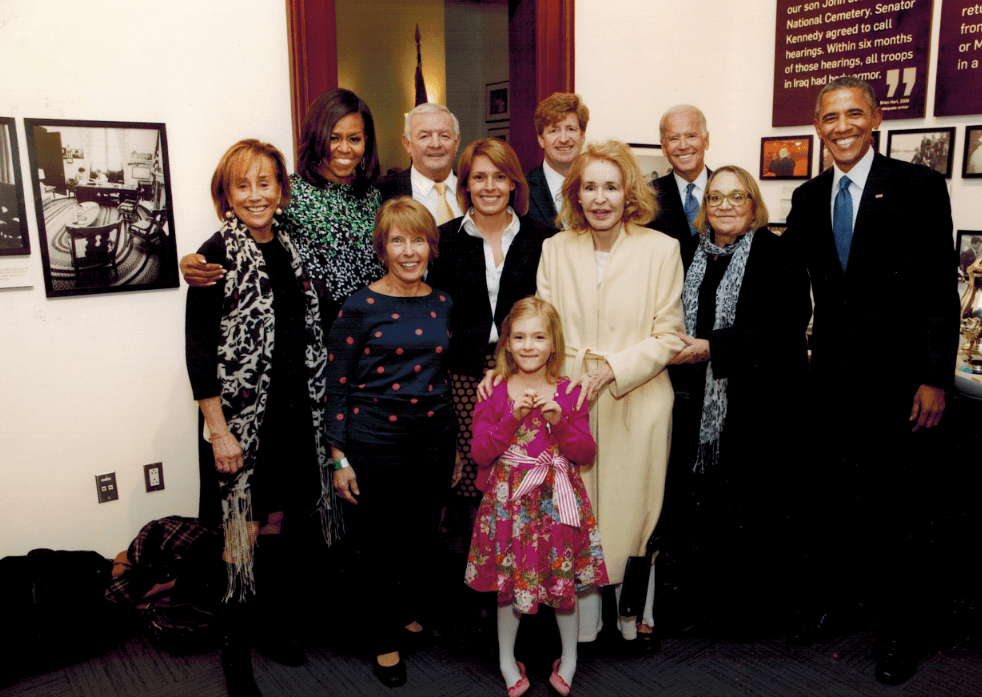
Release of the New York Times Bestseller, “A Common Struggle: A Personal Journey Through the Past and Future of Mental Illness and Addiction”
In this intensely personal account, Patrick shared his recovery from bipolar disorder and addiction, reflected on the tendency to treat mental illness as a family secret, and provided a blueprint for the future of mental health policy in America.
State of the Union in Mental Health and Addiction
Patrick and former US Surgeon General Dr. David Satcher host the State of the Union in Mental Health and Addiction at the National Press Club, Washington, DC.
ONDCP 25th Anniversary
Patrick attends the White House’s 25th Anniversary Celebration of ONDCP’s National Alcohol & Drug Addiction Recovery Month.
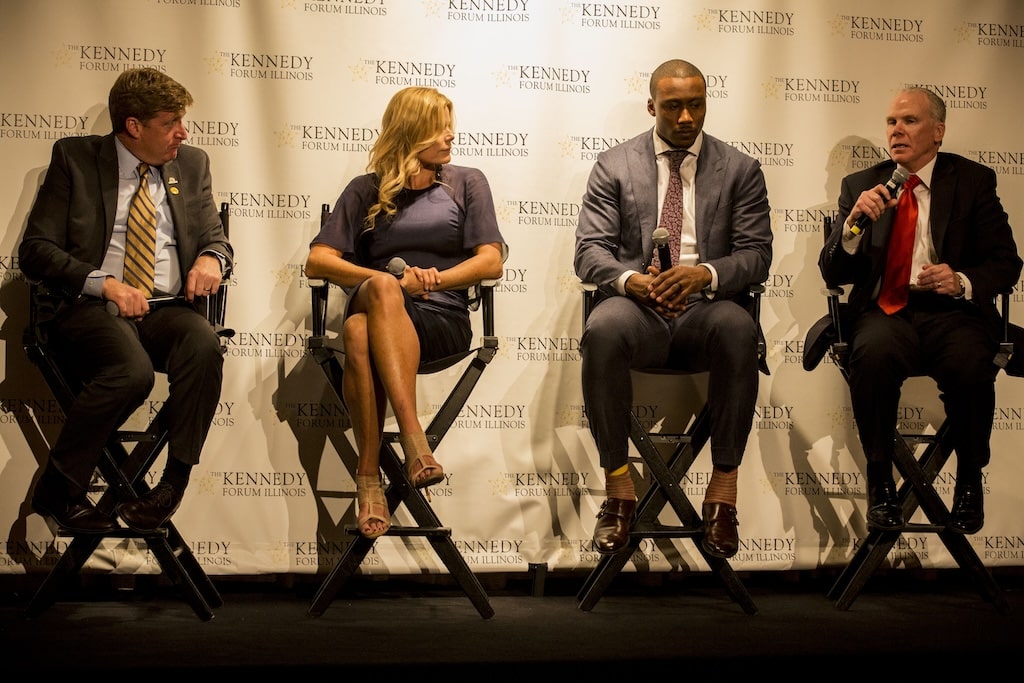
The Kennedy Forum Illinois Inaugural Forum: The Cost of Doing Nothing
Patrick and Peter J. O’Brien, CEO of MADO Healthcare host The Kennedy Forum Illinois Inaugural Forum: The Cost of Doing Nothing, in Chicago, IL. Featured speakers included Brandon Marshall, NFL football player and mental health advocate; former US Surgeon General Dr. David Satcher; Rep. Sara Feigenholtz; Mariel Hemingway; Mayor Rahm Emanuel; Governor Pat Quinn; and Senator Dick Durbin (D-IL).
White House Easter Egg Roll
Patrick, Amy, Harper, Owen, and Nora attend the annual White House Easter Egg Roll.
Co-founded The Kennedy Forum Illinois
Patrick partners with Peter J. O’Brien, CEO of MADO Healthcare to co-found The Kennedy Forum Illinois to work toward lasting change in the way mental health and addictions are considered and treated in the State of Illinois.
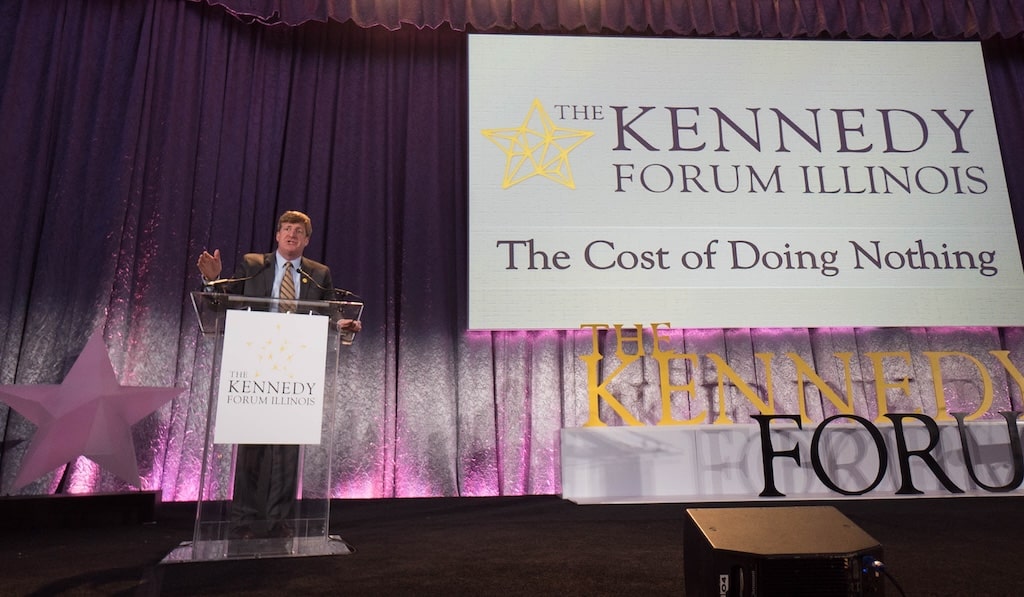
White House, ONDCP Drug Policy Reform Conference
In celebration of the 50th Anniversary of the JFK Symposium,
Patrick serves as a panelist on Lifting the Stigma of Addiction, a discussion of medication assisted recovery.
The Kennedy Forum National Conference
Patrick hosts The Kennedy Forum conference at the John F. Kennedy Presidential Library in Boston. This inaugural conference featured speakers included Dr. Aaron ‘Tim’ Beck; former US Surgeon General Dr. David Satcher; Chris Matthews from Hardball; Pamela Hyde, Administrator of SAMHSA; Dr. Tom Insel, Director of NIMH; Dr. Nora Volkow, Director of NIDA; Brandon Marshall, NFL Player and Mental Health Advocate; Secretary Kathleen Sebelius, Secretary of Health and Human Services; and Vice President Joseph Biden.
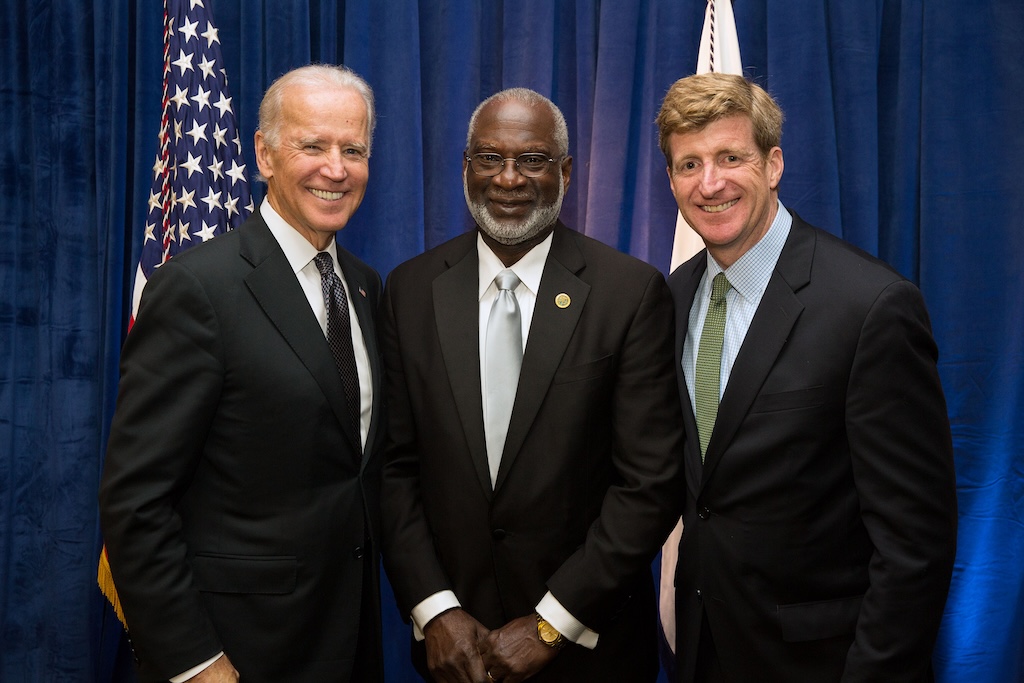
Patrick & Amy Kennedy co-founded The Kennedy Forum
Patrick and Amy Kennedy co-found The Kennedy Forum, a non-profit organization whose mission is to lead a national dialogue on transforming mental health and addiction care delivery by aligning mental health advocates, business leaders, and government agencies around a common set of principles, including full implementation of the Federal Parity Law. The Forum aims to achieve health equity by advancing evidence-based practices, policies, political will, and programming in mental health and addiction treatment.
Democratic National Convention
Patrick and Amy attend the Democratic National Convention in Charlotte, NC. The DNC hosts a tribute to Senator Edward M. Kennedy.
Co-founded One Mind
Together with Garen and Shari Staglin, Patrick started One Mind to help eliminate the stigma of brain disease and to lead the community in revolutionizing collaboration, research, and funding. By forming global partnerships within the governmental, corporate, scientific, and philanthropic communities, One Mind is accelerating large-scale research through “Open Science” data sharing and collaboration.
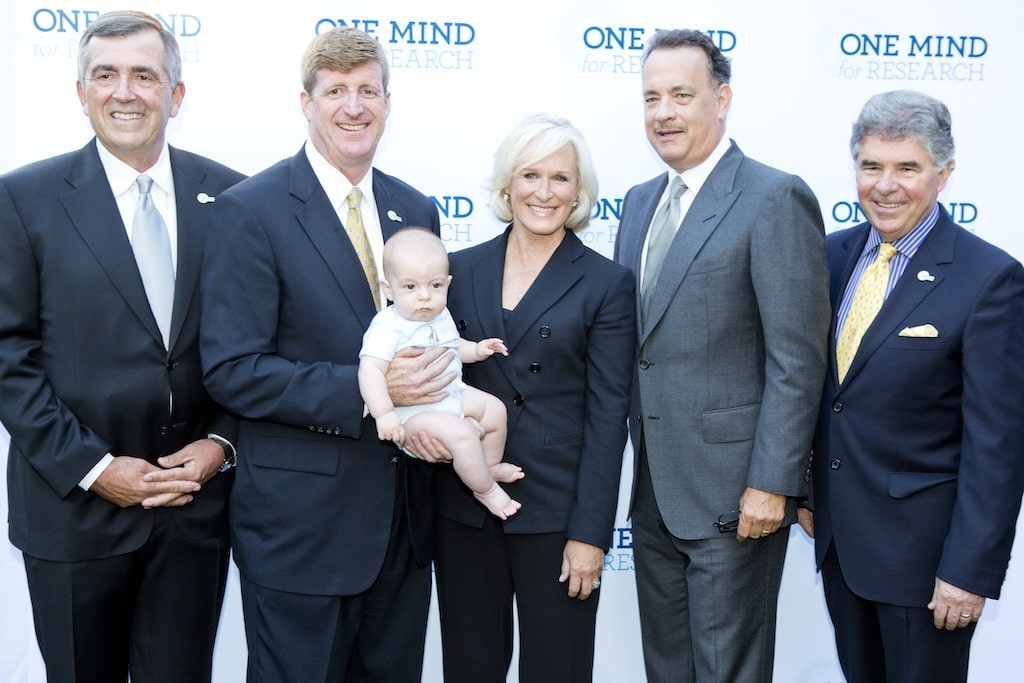
Championed legislation to expand the use of electronic health records
Patrick introduced the Health Information Technology Extension for Behavioral Health Services Act to improve the diagnosis and treatment of mental health conditions and addictions by extending financial incentive eligibility to behavioral health providers for the use of electronic health records.
Passed Landmark Legislation to End Insurance Discrimination Against People Experiencing Mental Illness and Addiction
Patrick built bipartisan support and led the passage of the Mental Health Parity and Addiction Equity Act of 2008, which was signed into law by President George W. Bush. The Parity Act requires insurance companies to cover of the brain, like bipolar disorder or alcohol use disorder, the same as diseases of the body, like cancer or heart disease. In addition to its powerful legal protections, the Federal Parity Law reduces the stigma surrounding behavioral health conditions.
Provided leadership to support the mental health of first responders
Patrick championed the Ready, Willing, and Able Act, which called on the Secretary of Homeland Security and the Secretary of Health and Human Services to establish a working group on the development of community-based disaster preparedness.
Championed Law on the Prevention and Early Intervention of College Suicides
Patrick was instrumental in the passage of the Garrett Lee Smith Memorial Act. This law increased access to mental health services for college students and expanded youth suicide prevention and early intervention.
Brought Awareness to Information Technology Through National Conference
Patrick organized the first of several Frontiers of Healthcare conferences, which focused on transforming healthcare through information technology. Patrick was joined with then Speaker of the House Newt Gingrich at the conference.
Patrick and Dr. David Satcher Begin Their Mental Health Advocacy Partnership
Patrick and Surgeon General Dr. David Satcher held hearings in Providence, RI at the State House on children’s mental health. Dr. Satcher released the first Surgeon General’s Report on Mental Health in 1999 and continues to work with Patrick on increasing access to mental health care through the Kennedy Center for Mental Health Policy and Research housed within the Satcher Health Leadership Institute at the Morehouse School of Medicine.
Passed Monumental Legislation on Children’s Mental Health
Patrick was the lead sponsor of the Foundations for Learning Act. This bill established a grant program to improve mental and emotional health for school children through screening and early intervention. The bill was incorporated into the No Child Left Behind law, which was signed into law by President George W. Bush on January 9, 2002.
Begins Service on the Powerful Appropriations Committee
Patrick joined the House Appropriations Committee where he served on two subcommittees: (1) Labor, Health and Human Services, Education, and Related Agencies and (2) Commerce, Justice, Science, and Related Agencies. This is the influential panel that has authority over all of the federal government’s discretionary spending. While Patrick was appointed to the Appropriations Committee in 1998, he did not begin his position until after his tenure as Chairman of the Democratic Congressional Campaign Committee.
Becomes a Public Advocate for Mental Health Care Reform
At an event with Tipper Gore, Patrick reveals in public for the first time that he suffered from depression and that he had been treated by a psychiatrist. This moment marks Patrick’s entrance as a leading public advocate for mental health and substance use disorder reform.
Served as the Chairman of the Democratic Congressional Campaign Committee
Patrick became the Chairman of the Democratic Congressional Campaign Committee. Patrick served as the Chairman until 2001.
Elected to Congress
Patrick was elected as a Democrat to represent the 1st Congressional District of Rhode Island. Patrick was the youngest member of Congress in 1995 and served on the House Armed Services Committee. He was re-elected seven times and served until January 3, 2011 when he left Congress to focus on a healthier lifestyle and start a family.
Championed Gun Reform Legislation
Patrick was the primary sponsor of a bill that mandated a seven-day waiting period before purchasing firearms.
Elected to Rhode Island Legislature
Patrick became the youngest member of the Kennedy family to hold public office when he won election to the Rhode Island House of Representatives at age 21 while a junior at Providence College.
